Who wouldn’t want to take in the ancient architecture of Rome while studying international law or see landmarks like Big Ben and Buckingham Palace while learning about comparative trial advocacy in the heart of London? Who can resist the rush of adrenaline found in a bustling New York City law firm while learning about asset finance or the glitz and glamour of Los Angeles while studying bankruptcy law? These are just a few of the options offered to students enrolled in the Syracuse University College of Law’s JDinteractive (JDi) hybrid online program, as they work to complete six required in-person residencies.
“Our residencies have become a hallmark of our JDi program, and we will continue to promote this type of high-quality experiential learning moving forward.”
Shannon Gardner, Associate Dean for Online Education
A Warm Orange Welcome

The first and second of the six required residencies have the JDi students traveling to the Syracuse University campus. The first residency, Legal Foundations, happens the week before the start of fall classes. Students spend five days in Dineen Hall getting a solid foundation in U.S. government and legal systems, as well as a clear understanding of the rigors of law school study methods and other skills, to set them up for a successful experience.
“This puts everyone at the same starting level with an equal base knowledge to succeed in the JDi program,” says Gardner. “It also helps students feel connected to Syracuse Law right from the start, whether they are participating from across town or the country.”
Members of the JDi incoming Class of ’27 came to the Syracuse campus in August 2023 for their first residency experience. Not only did they take away a lot of knowledge, but they also had the chance to walk the campus, experience the city, and, of course, stop to purchase some Syracuse University merch to wear proudly back home. Students were officially welcomed during Convocation, along with the incoming residential law students, as Zabrina Jenkins G’97, L’00, former general counsel for Starbucks, gave the keynote address.
Students had the opportunity to visit the James M. Hanley Federal Building and U.S. Courthouse in downtown Syracuse. And, lunch at the world-renowned Dinosaur Bar-B-Que added a flavorful touch to their visit. In addition, the Dean’s Dinner, hosted by Dean Craig Boise, gave students a valuable opportunity to network with faculty, staff, and classmates, and an event at Skaneateles Country Club connected them with more area alumni.
JDi students returned to campus again just before the start of the spring semester for Legal Applications, a five-day residency on practical skills like public speaking, negotiations, interviewing, research, and writing. The 1Ls also visited Salt City Market, a downtown attraction featuring a diverse menu from local vendors, and later went to a networking event sponsored by the Student Bar Association.
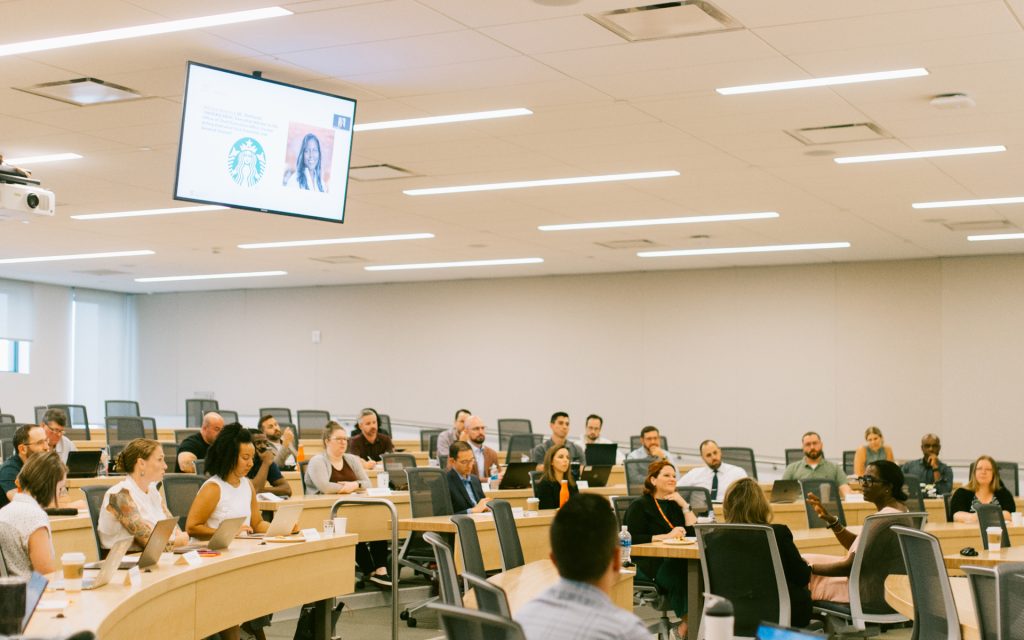
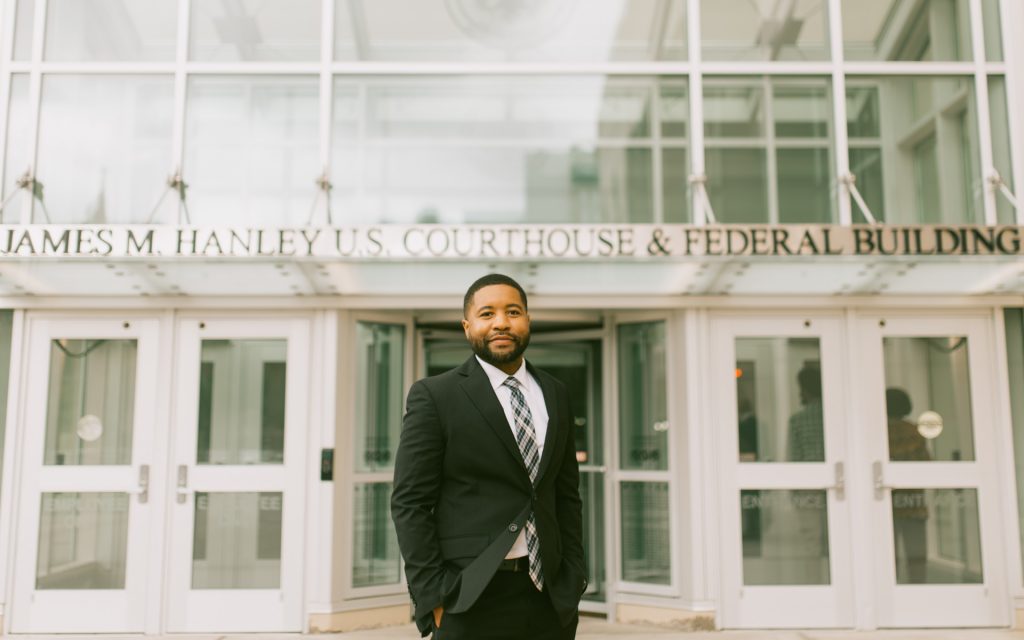
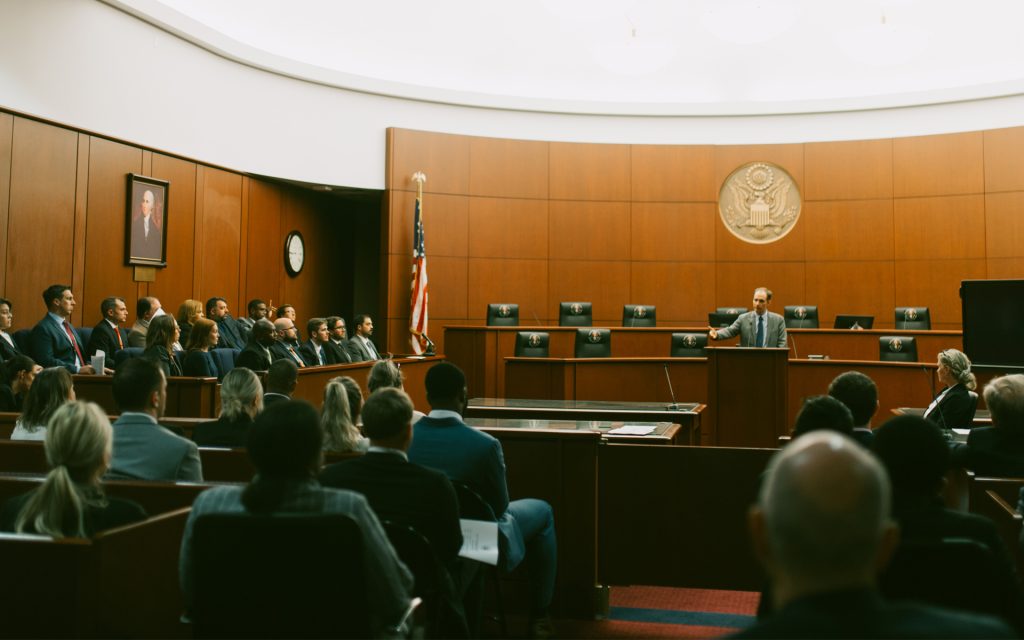
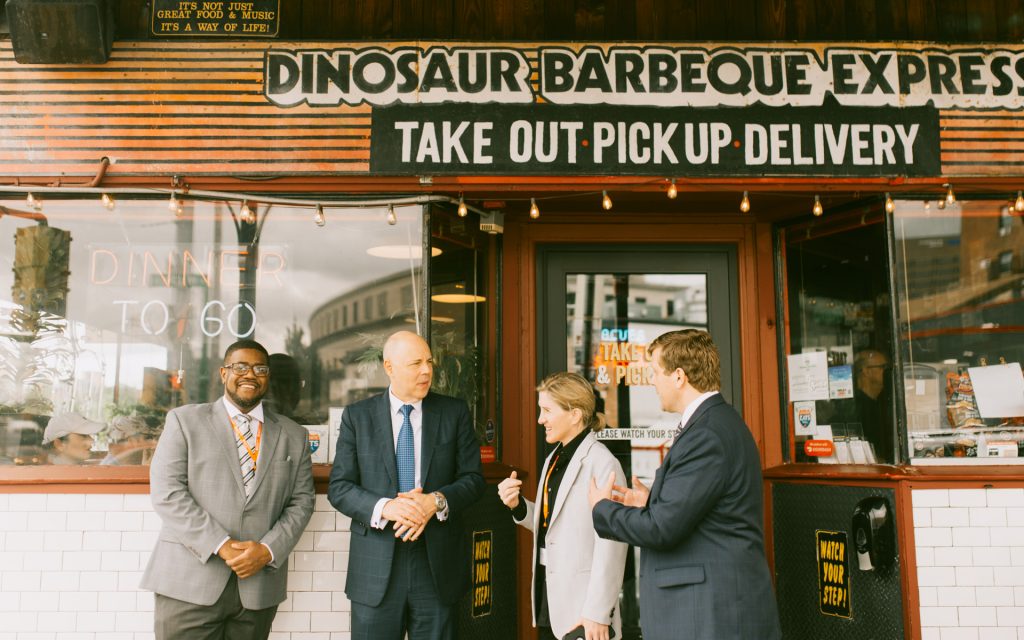

Back to Campus to Learn Professional Skills
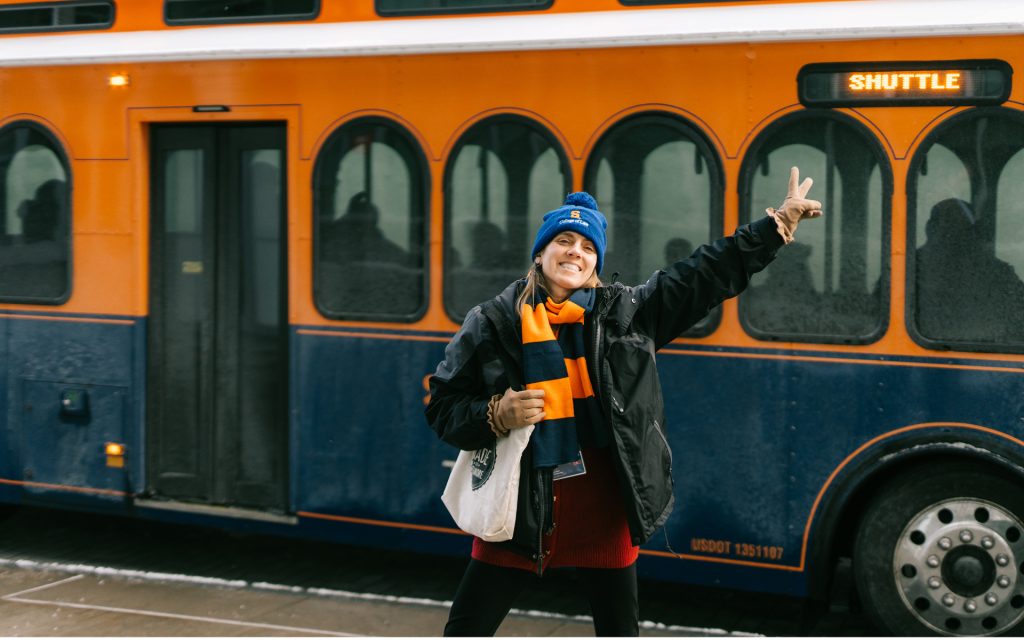
The third and fourth residencies, Professional Skills, take place together at the Syracuse Law campus over five days, allowing students to choose from a variety of topics at the start of their fifth semester of the JDi program. Last January, options included Negotiations, Trial Advocacy, Legal Ethics in National Security, Advanced Litigation, Criminal Investigation, Media Training, Administrative Representation for Veterans, Oral Communications, Lawyer as Counselor, Title IX Investigations, and The Right to Equal Access to the ADA.
Some students who attended the 2024 spring residencies had the chance to hear from the Hon. James Baker, Professor and Director of the Institute for Security Policy and Law, as he spoke on the ethical challenges that arise in national security policy and legal practice.
“I value the exposure to different styles of negotiations amongst my peers and how it compares to my style. The residency made me uncomfortable but pushed me to advocate in unfamiliar territory and collaborate with classmates I never worked with before.”
Yendi Fontenard L’26
Professor Beth Kubala, Executive Director of the Betty and Michael D. Wohl Veterans Legal Clinic gave JDi students the opportunity to learn more about working through the regulatory requirements of the U.S. through the Administrative Representation for Veterans course. And, Professor Todd A. Berger, Director of Advocacy Programs, helped students learn to be a trial counsel in simulated exercises, including practicing opening and closing arguments and cross-examinations. Still, other JDi students received media training, a vital skill for many attorneys, from Professor Kevin Noble Maillard, under the lights at the Dick Clark Studios at the University’s S.I. Newhouse School of Public Communications.
“Hands down the best residency was my most recent with Professor Todd Berger and Professor Raul Velez,” says Yendi Fontenard L’26, a manager in the employee labor relations and workforce compliance department at Jackson North Medical Center in Miami. “I selected this option not because I want to be a trial attorney but because I want to be quicker on my feet and understand the courtroom dynamic.”
“A close second was negotiations with Professor (Antonio) Gidi,” she says. “I value the exposure to different styles of negotiations amongst my peers and how it compares to my style. The residency made me uncomfortable but pushed me to advocate in unfamiliar territory and collaborate with classmates I never worked with before.”
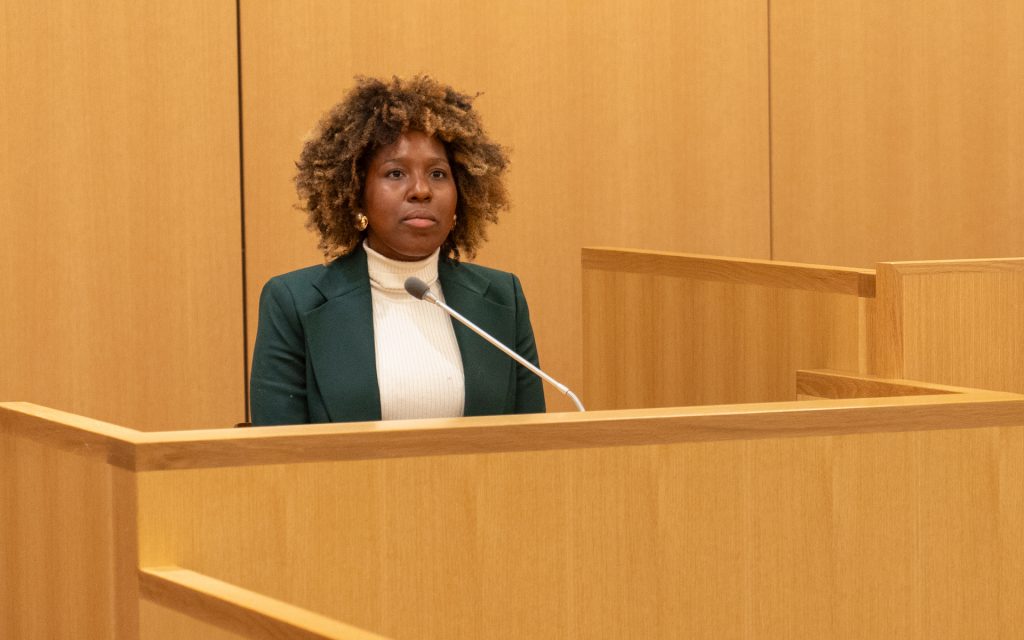
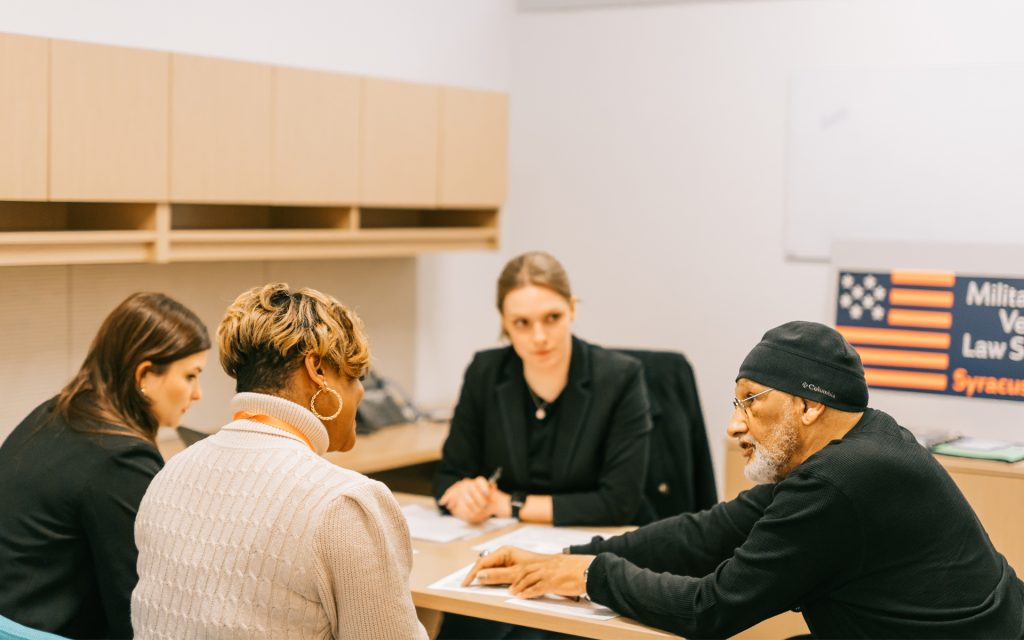
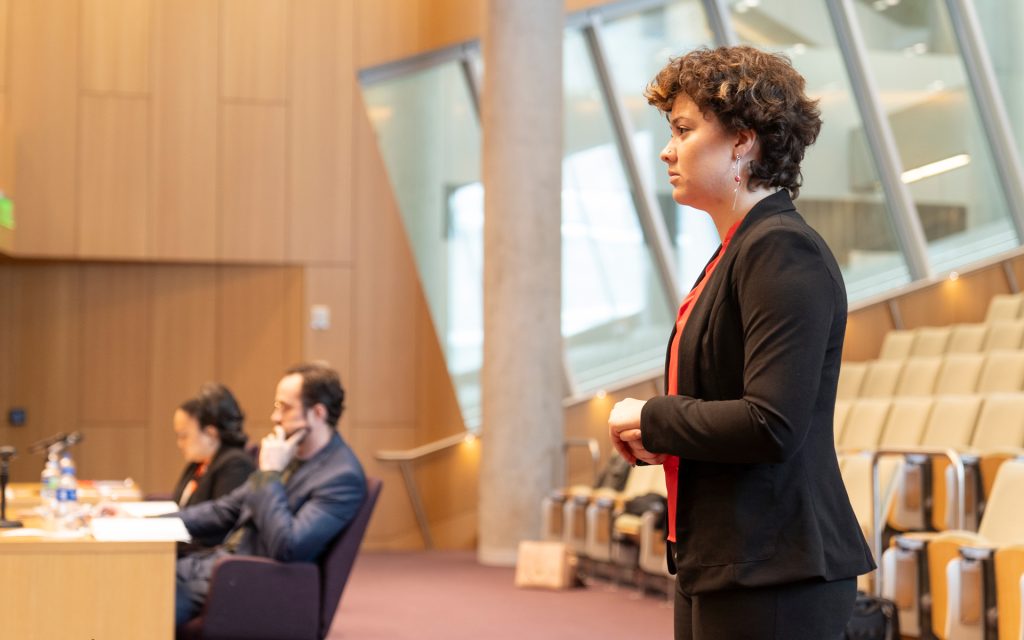
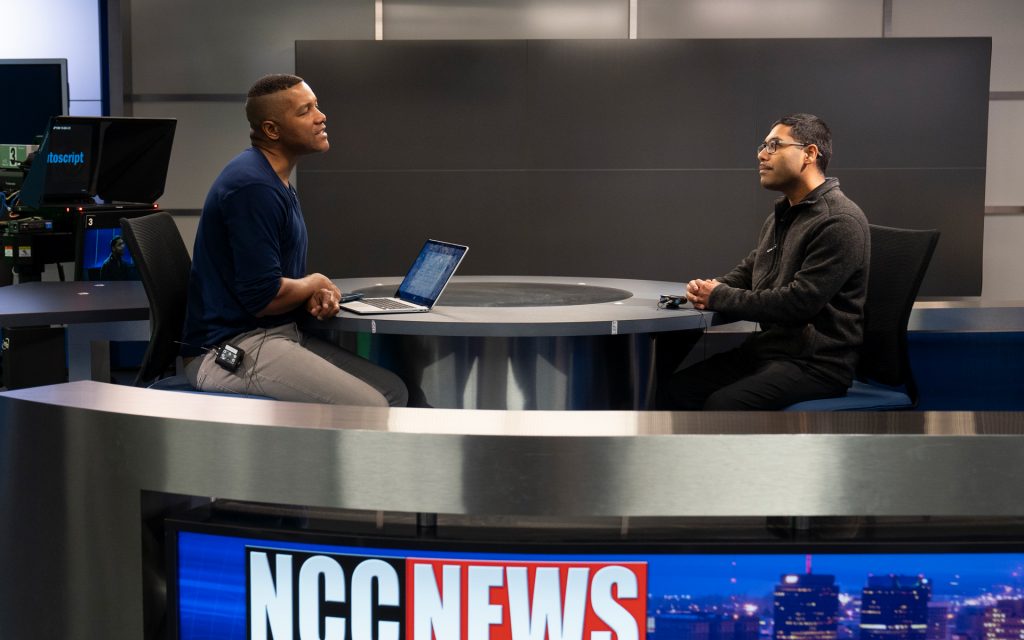
Advanced Legal Topics
While time on campus is a dream come true for many, the outstanding opportunities to travel to other parts of the country and even internationally through the Advanced Legal Topics residencies, offered several times each semester, are truly a highlight. These advanced residencies last from four days to a week and allow students to take a sharp focus on specific topics of interest, while also visiting somewhere new. Topics and locations vary from year to year to offer a wide range of learning opportunities in fascinating locations. There are several Advanced Legal Topic residencies available on campus, as well.
“Our Advanced Legal Topics mirror a traditional law school seminar class,” says Gardner, noting that most have between 20 and 30 students enrolled. “There are a number of options, so students can pick and choose according to their interests. And, we are fortunate that many alumni host us at their law firms or other places of business and give our students access to sites they might otherwise not get to experience.”
London, England: Comparative Trial Advocacy
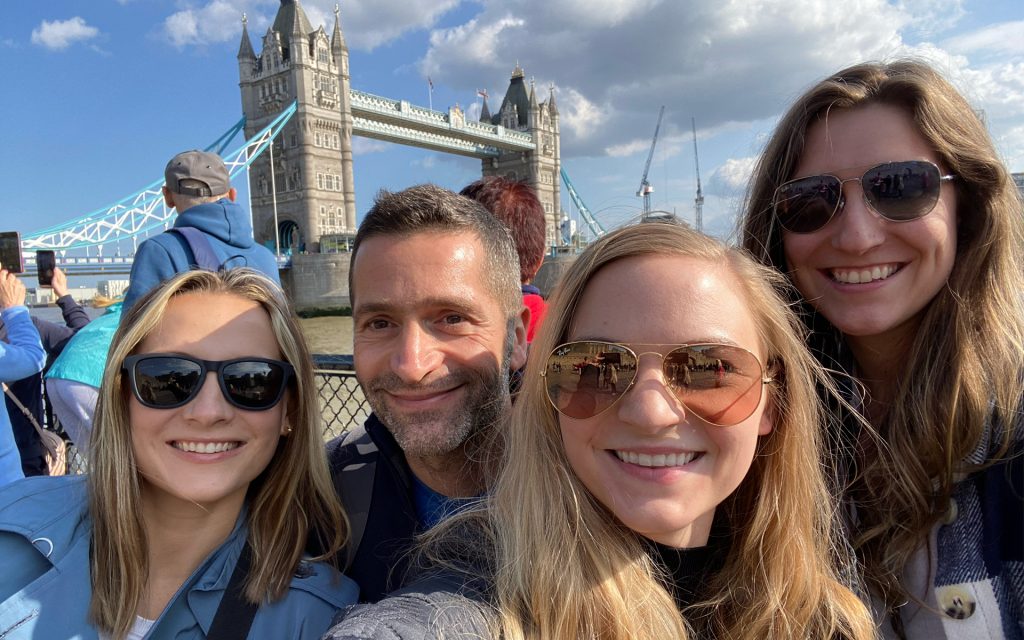
Students traveled to the U.K. to spend a week in London in May 2023 to see firsthand the various aspects of trial advocacy in a global setting and hear the diverse perspectives and insights from barristers and solicitors from a wide cross-section of criminal and civil practice areas.
“British law is the mother of U.S. law, so this was an amazing opportunity to be fully immersed in British law in a hands-on way that was very dynamic.”
George Saad L’25
Comparative Trial Advocacy was coordinated by Professor Berger and A.J. Bellido de Luna, assistant dean for advocacy programs and Hardy Service professor of law at St. Mary’s University School of Law in Texas, a visiting professor at Syracuse Law. It exposed students to the fundamentals of influential storytelling, case analysis, witness examination, and persuasive arguments. Students gained knowledge of the differences and similarities between the U.K. and the U.S. legal systems through guest lectures given by local practitioners and visits to civil and criminal courtrooms and law offices throughout London. And, they were given a tour of the Supreme Court of the United Kingdom and allowed to sit in the chamber.
“British law is the mother of U.S. law, so this was an amazing opportunity to be fully immersed in British law in a hands-on way that was very dynamic,” says George Saad L’25, who after a 20-year career managing K-12 international schools in 20 countries is now managing partner, Capital Sourcing and Placement, in Phoenix, Arizona, and principle at NEXUS Associates, a consulting group. “I had gone to boarding school in the U.K., so traveling to London was of interest to me, and I was eager to do some work in trial advocacy, as I hadn’t had a chance to do that yet. It was a great immersive experience.”
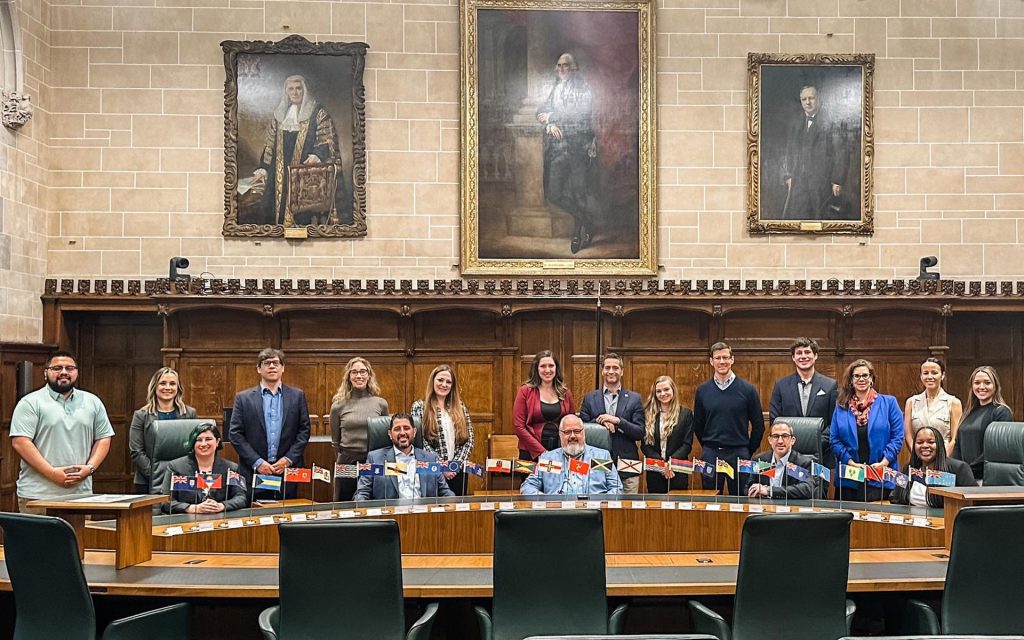
New York City: Asset Finance

In fall 2023, Syracuse Law held the Asset Finance residency, hosted by Richard Furey L’94, a distinguished attorney with a focus on international and domestic asset and infrastructure finance, specifically in the areas of aviation and maritime. The residency was held at Holland & Knight LLP, in Manhattan, where Furey is a partner, and for some JDi students, this was their first look at a big city law firm. The information was a holistic approach to understanding asset finance of aircraft, ships, rail cars, and automobiles, as well as fundamental financing structures, regulations, treaties, tax matters, insurance, and bankruptcy issues related to the residency’s topic.
In addition, the JDi students had a unique opportunity to visit the headquarters of JetBlue in Queens, New York, to further enrich their understanding of asset finance in the aviation sector. This visit was made possible through Syracuse Law alumna Joanna Geraghty G’97, L’97, who is CEO of the airline and a former partner at Holland & Knight.
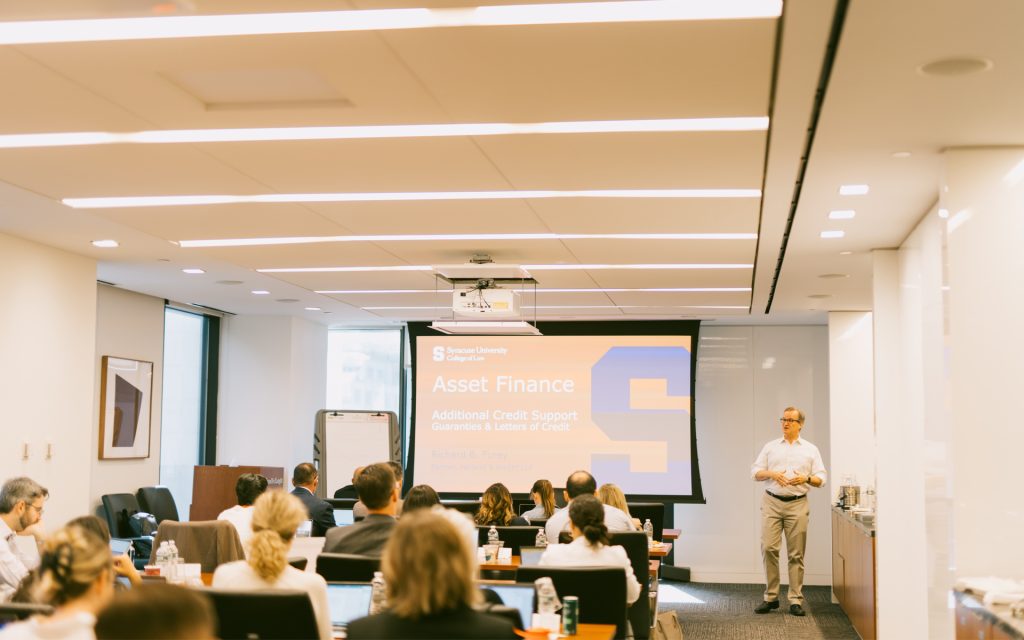

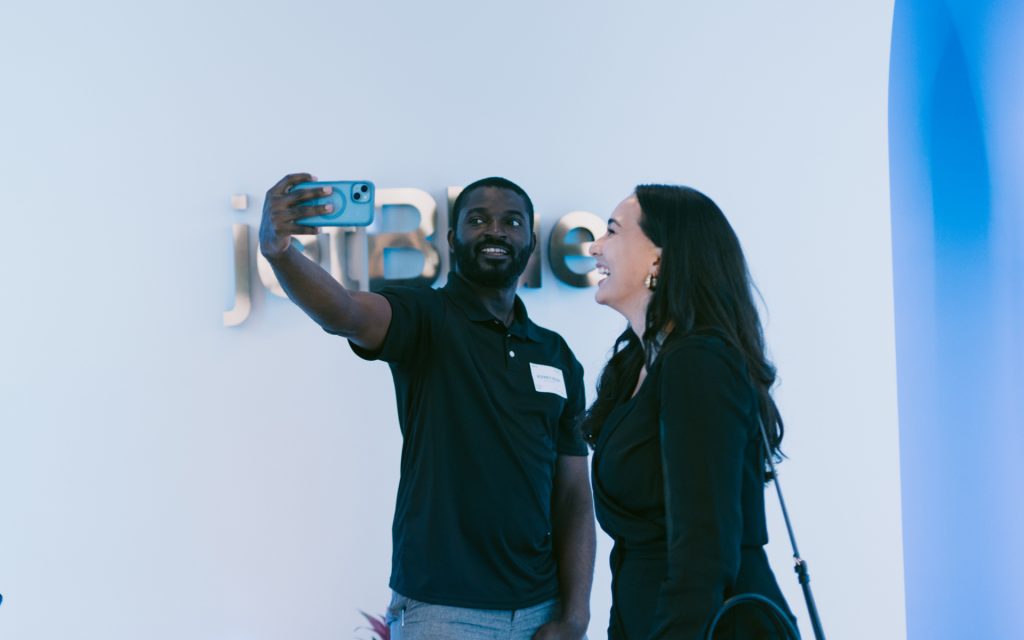
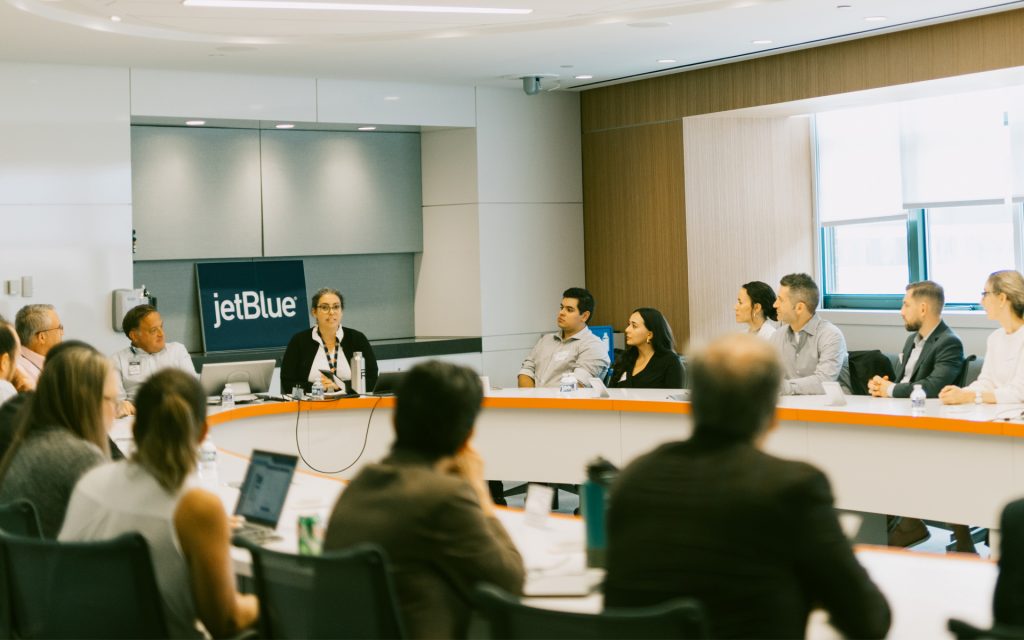
Denver, Colorado: Arbitration

Seventeen JDi students met in Denver in early January 2024, along with four students from Syracuse Law’s LL.M. program for the Arbitration residency. Professor Jack Graves led the class at the firm of Sherman & Howard, LLC, courtesy of alumnus Skip Netzorg L’76. The Arbitration residency provided an introduction to the law and practice of arbitration with the students drafting arbitration agreements, navigating enforcement of such agreements during disputes, conducting fair and efficient arbitration proceedings, and learning about enforcing the final awards issued by arbitrators. By the end of the residency, students had gained a solid foundation of the use of arbitration in resolving legal disputes, as well as insight into the issues that often arise during the drafting and implementation of arbitration agreements.
“The residencies have been such a great part of the JDi program, and Denver was no different. It was wonderful to interact with classmates and professors in person.”
Amanda Higginson L’25
The group also had time for some socializing, as they attended an alumni networking event at a local brewery. In addition, Mark Neporent L’82, chief operating officer, senior legal counsel and senior managing director, Cerberus Capital Management; and Dean Craig Boise held a fireside chat, where they advised the JDi students about entering and navigating the legal profession. Neporent told his story of moving from in-house practice at a law firm to one of the largest global hedge funds.
“The residencies have been such a great part of the JDi program, and Denver was no different. It was wonderful to interact with classmates and professors in person,” says Amanda Higginson L’25, associate dean for student affairs, clinical sciences and clinical professor of pediatrics at the Brody School of Medicine, East Carolina University. “Professor Graves’ class on Arbitration was amazing and really exposed me to a field of law I didn’t know much about, and it was great to see Dean Boise out in support of the JDi program.”
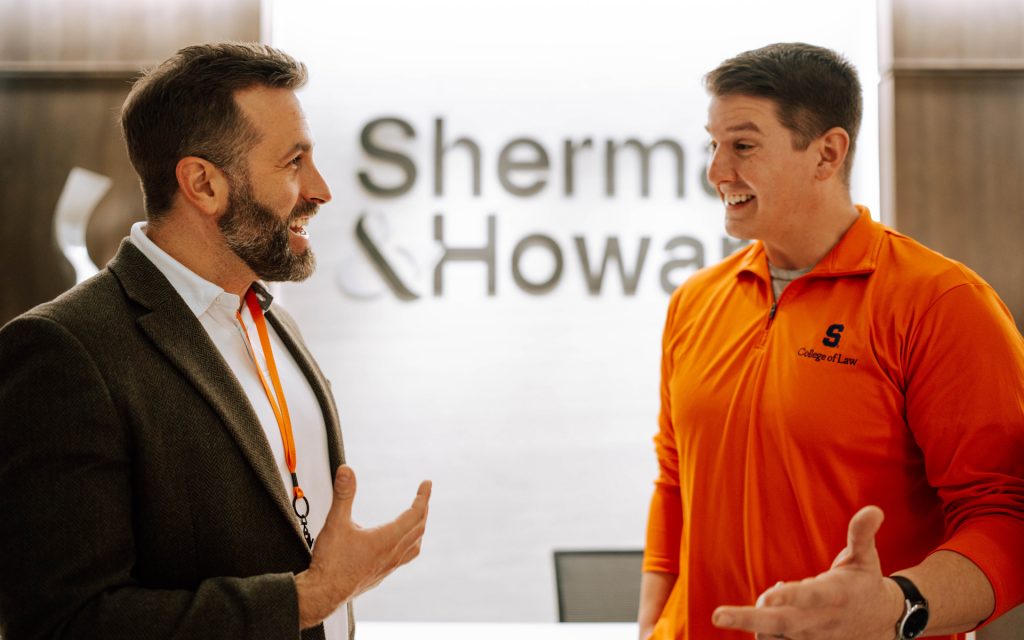
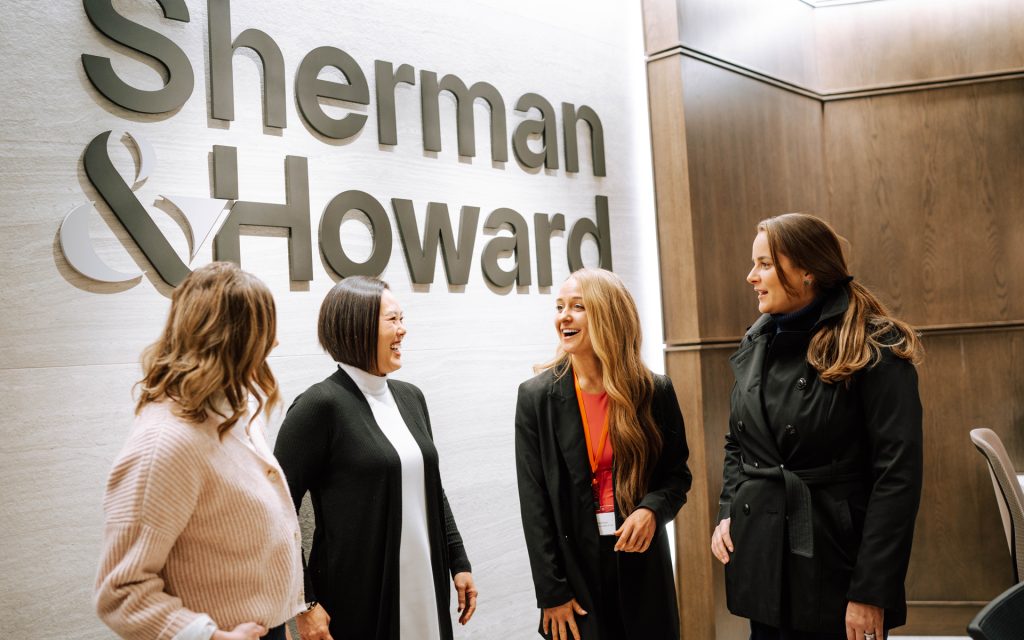
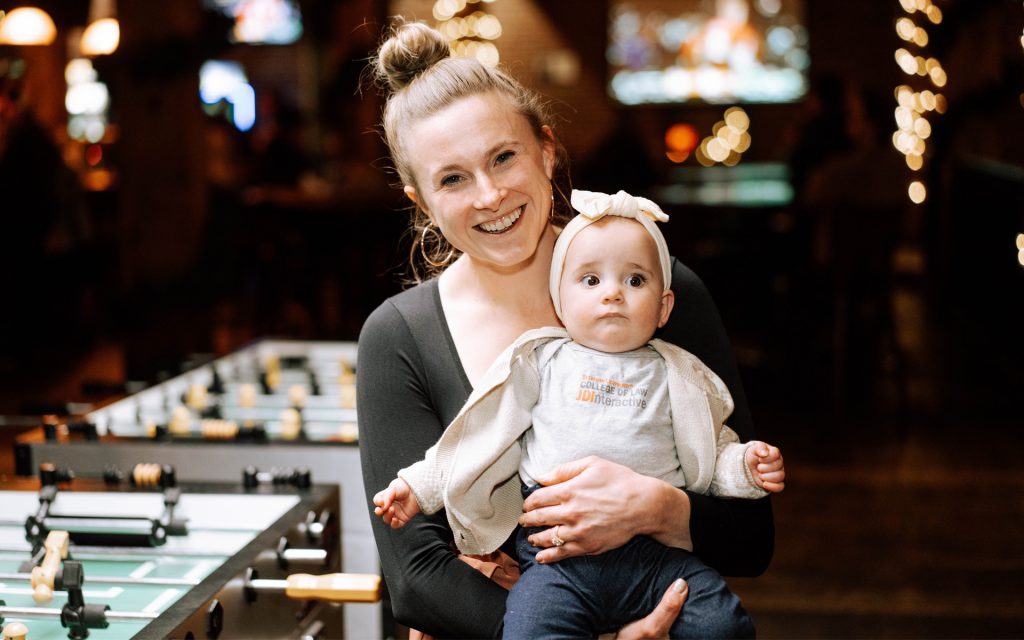
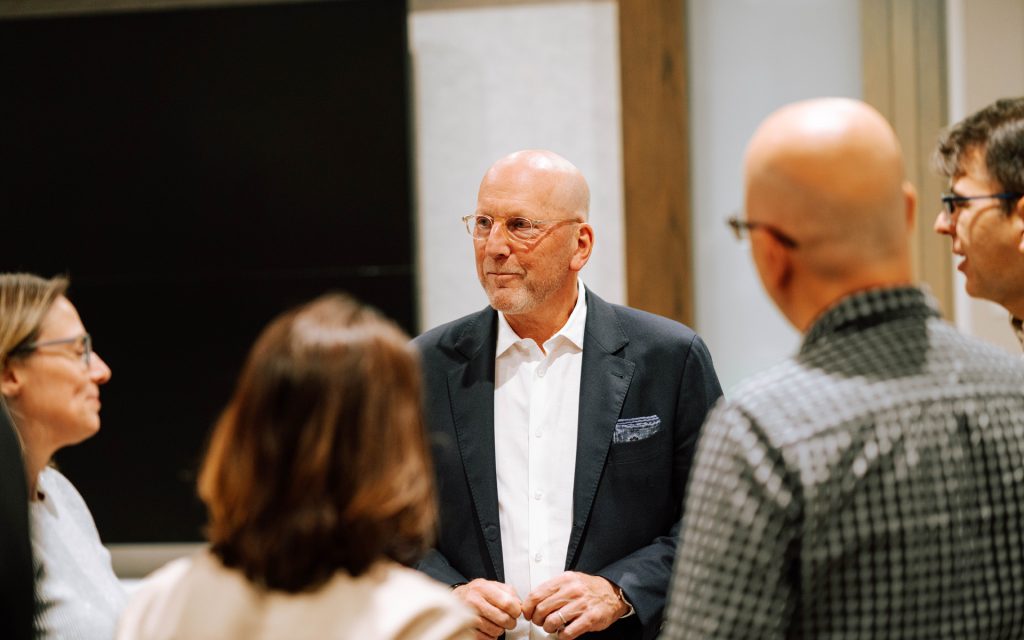
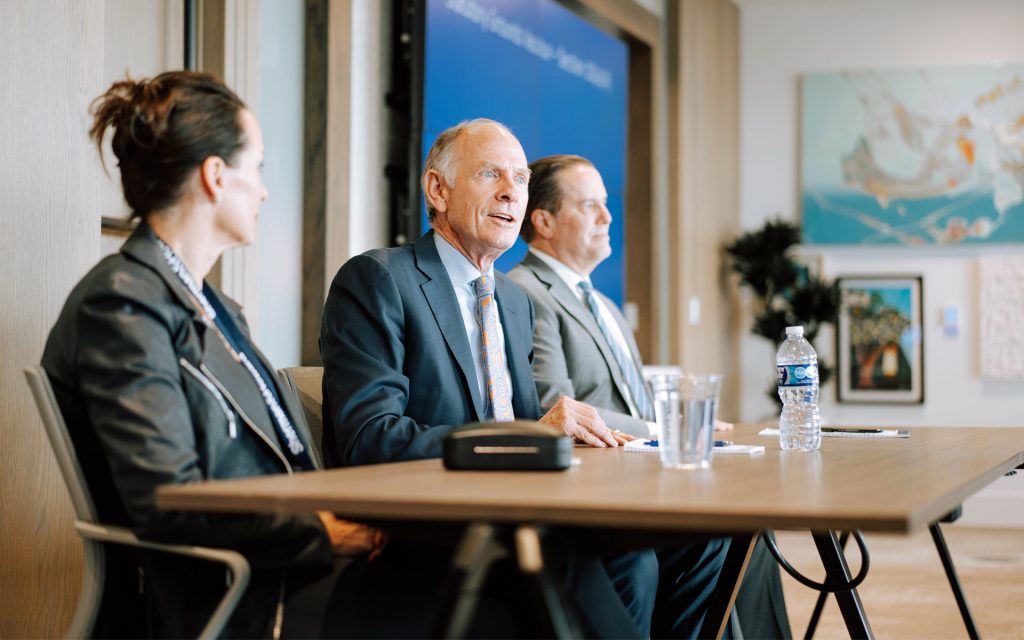
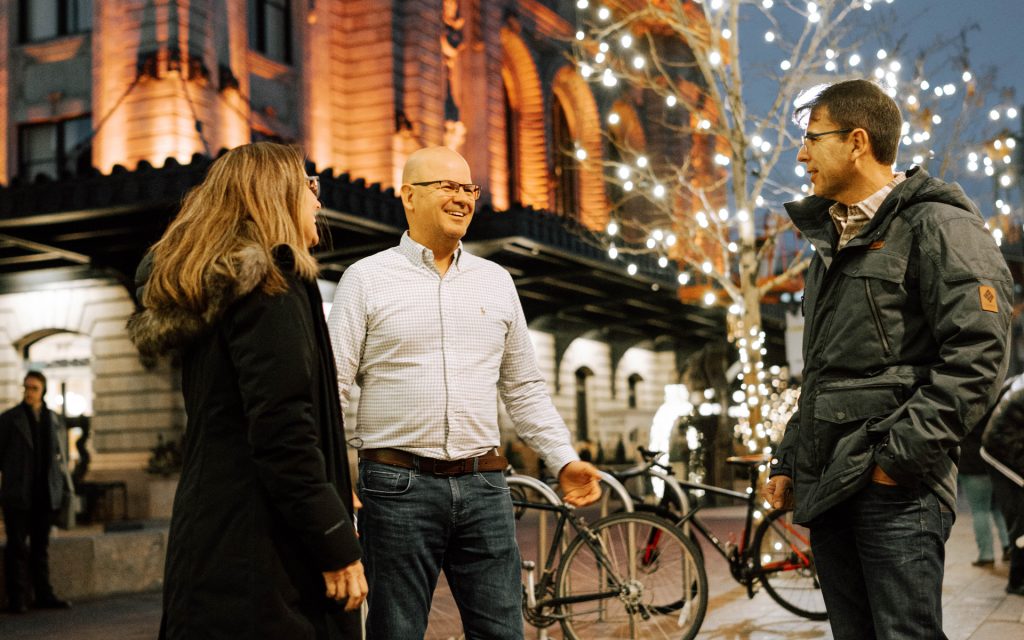
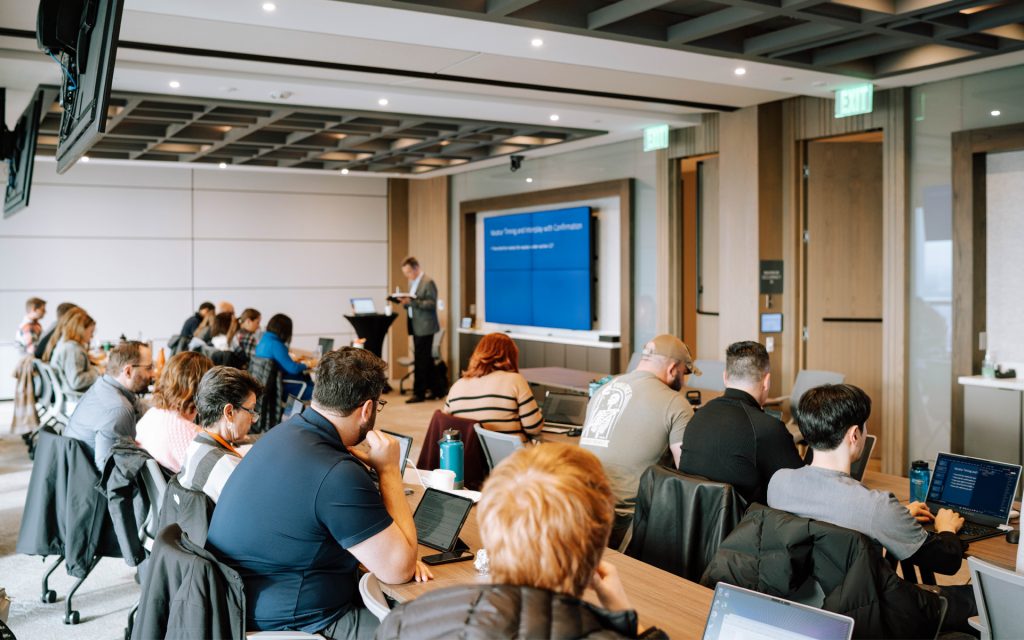
Los Angeles, California: Bankruptcy
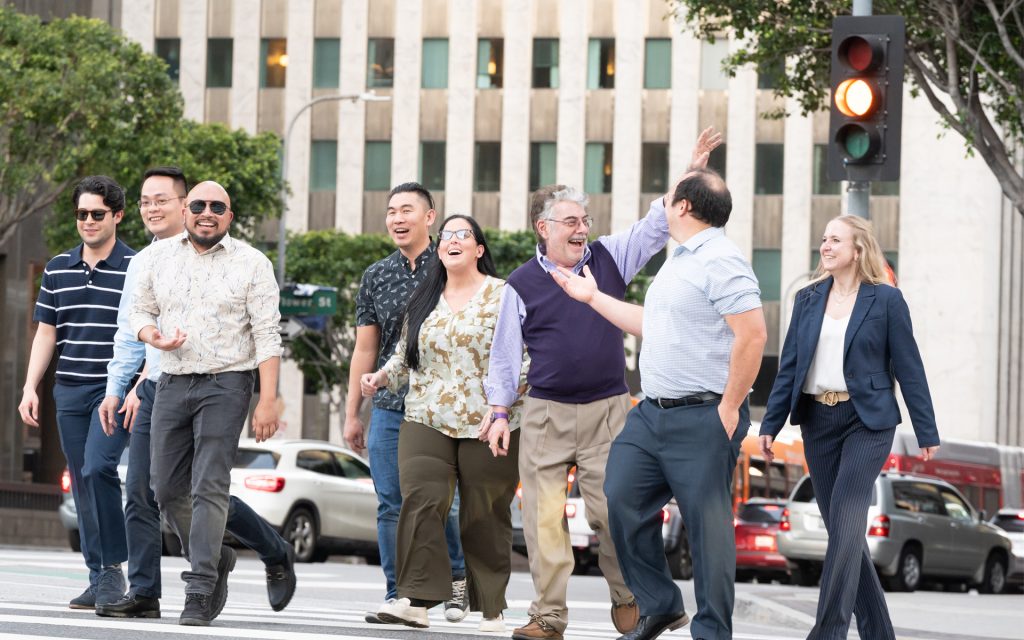
Taught by Richard Levy Jr. L’77, a bankruptcy and creditors’ rights counselor and litigator at Pryor Cashman, LLP, the Bankruptcy residency in Los Angeles took place in March 2024. Goodwin Proctor LLP hosted the students for lectures on the rights and treatment of secured and unsecured creditors under the U.S. Bankruptcy Code. In addition, the course examined a range of creditor remedies under state laws affecting creditors’ rights. Levy was assisted by several guest lecturers, including a U.S. bankruptcy judge and a federal bankruptcy trustee.
“One of my favorite parts of the trip was the camaraderie between the class and the time I got to spend with the people in my cohort. These residencies offer such a priceless bonding moment on personal and legal levels that have a positive ripple effect far beyond the classroom.”
Kelsey Grant L’25
In addition, Melanie Gray L’81, chair of Syracuse Law’s Board of Advisors and retired complex commercial and bankruptcy litigation partner at Winston & Strawn LLP, was a keynote speaker and joined the students later for a fireside chat. The students also visited the U.S. Bankruptcy Court followed by an alumni networking event later that evening.
“The highlight of the trip was listening to Melanie Gray talk about her experience as a woman in law and how she’s faced adversity throughout her career,” says Kathryn Martin L’24, a tax director at a private trust firm in Nevada, whose trip to Los Angeles was her sixth residency.
Others in the program agreed that the residency was a success. “I’ve never been to downtown L.A.,” says Kelsey Grant L’25. “One of my favorite parts of the trip was the camaraderie between the class and the time I got to spend with the people in my cohort. These residencies offer such a priceless bonding moment on personal and legal levels that have a positive ripple effect far beyond the classroom.”
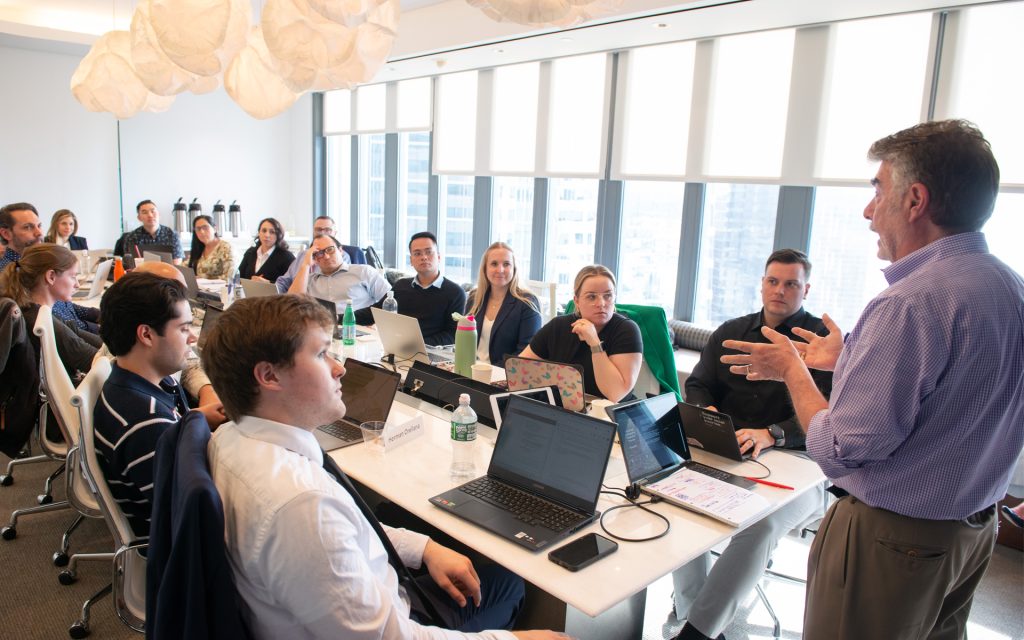
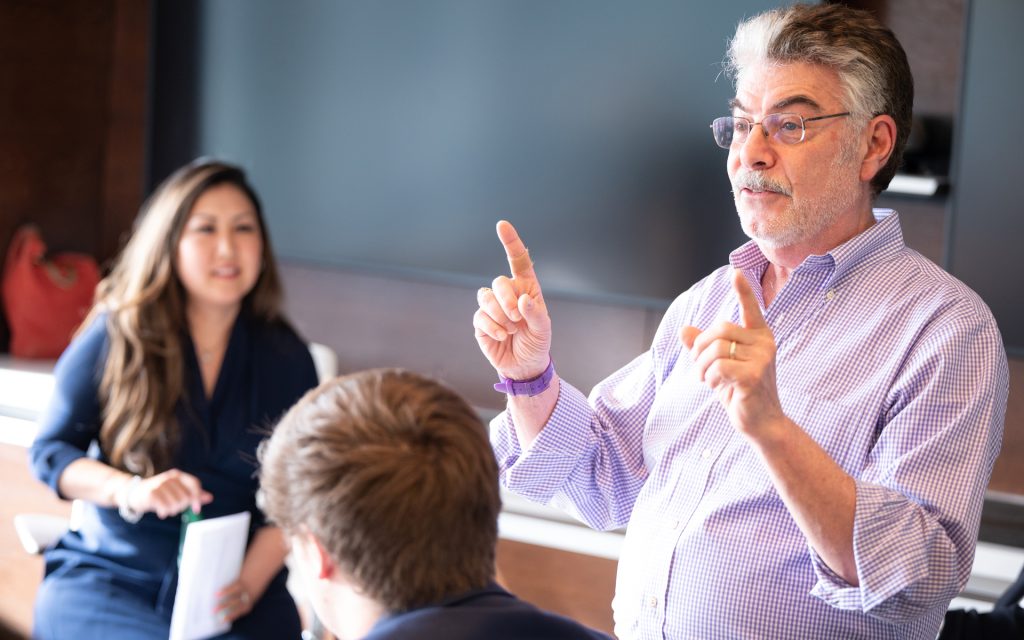
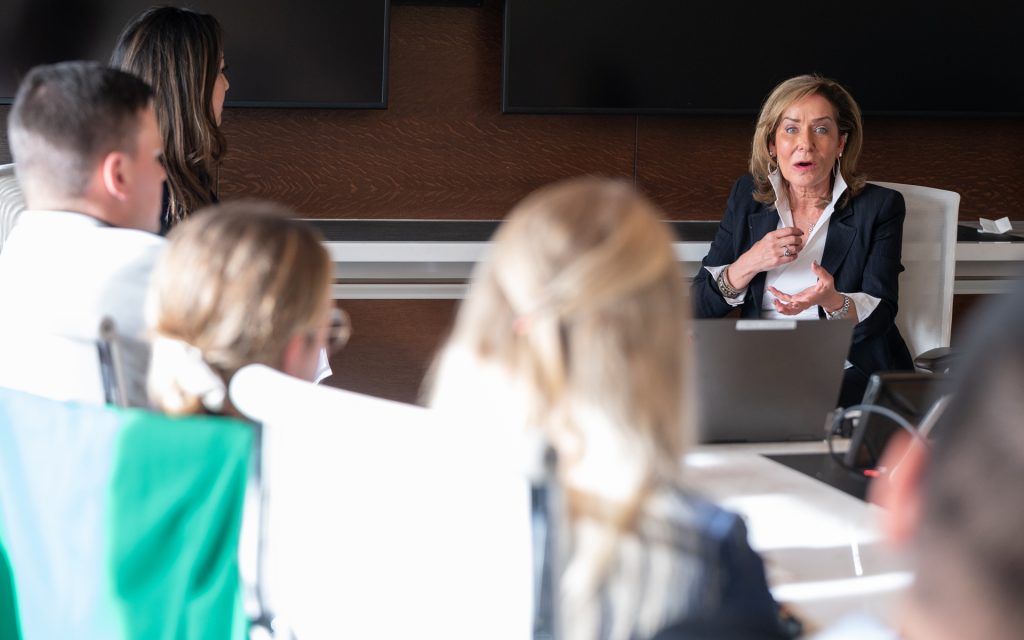
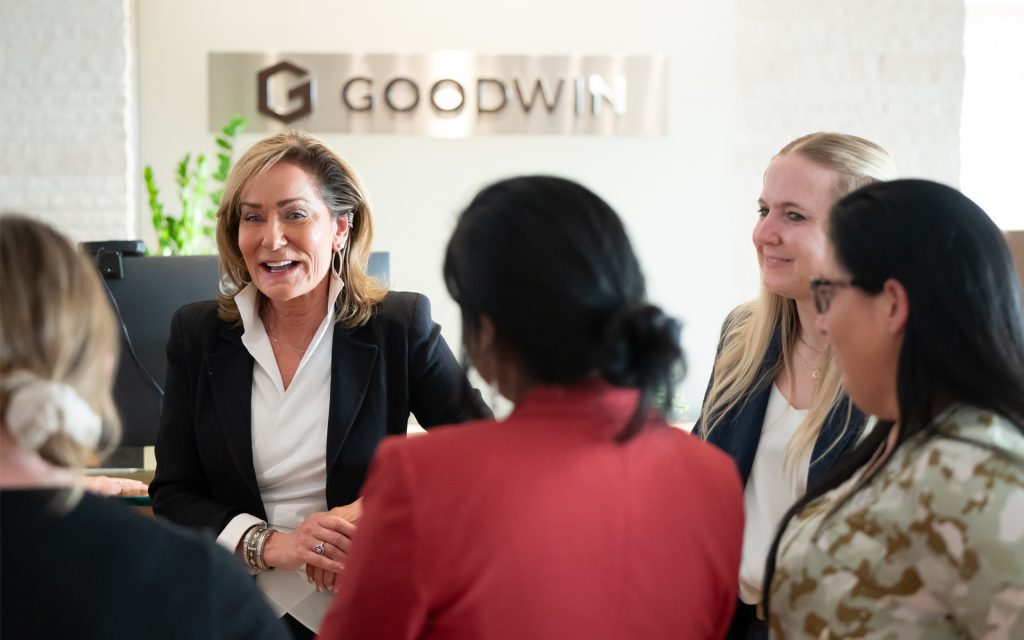
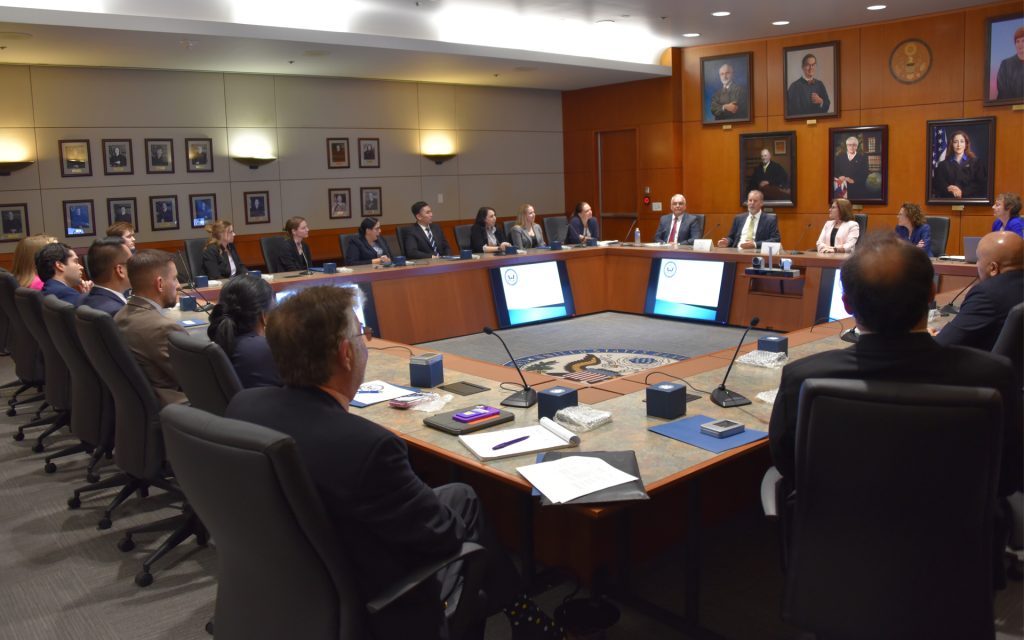
Geneva, Switzerland: International Tax Law

Through an invitation from Marnin Michaels G’96, L’96, a member of the Syracuse Law Board of Advisors and Senior Partner at Baker McKenzie in Zurich, the International Tax Law residency was held in Switzerland and led by Dean and Professor of Law Craig Boise. JDi students, as well as a few residential law students, prepared for the trip by attending two lectures with Boise prior to departure to ensure that the group already had a solid overview of international tax law before the residency began.
The first stop was three intensive days in Geneva, where they were invited by Michaels to use the international law firm of Baker McKenzie as their home base. He also served as an adjunct professor, working with Boise.
Students learned about the foundational principles of international tax law and gained a better understanding of tax competition, the practice of international tax law in civil law and common law jurisdictions, concepts of business and tax advising relative to transfer pricing, measuring risk and intangibles, common reporting standards under the Organization for Economic Cooperation and Development and other related issues.
The time in Geneva included meetings with two private banks that primarily deal with high net worth individuals: The Pictet Group and UBP Private Banking; a visit to the World Health Organization, where students learned how lawyers handled issues related to the pandemic from a legal standpoint; and a trip to the World Trade Organization and International Labor Organization, where they saw how taxes affect what other organizations do and how lawyers carry out their responsibilities. The group also heard from Prof. Dr. Réne Matteotti, University of Zurich, a tax attorney and professor who specializes in Swiss European and international tax law.
After staying in Geneva, the group traveled to Saas Fee, where they had a few mornings free to enjoy the beauty of the area and take in some skiing in the Swiss Alps. Lectures and networking opportunities took place later in the day, including a presentation from Professor of Law Dr. Robert Danon from the University of Lausanne, on the role and impact of arbitration in tax disputes.
“It was really helpful to get a broader picture of how international taxation works,” says financial advisor Benjamin Muladore L’25. “The biggest thing we learned is how international tax law is very different from domestic tax law in terms of what lawyers do to help their clients. In the U.S., we think of taxes as one day of the year and tax lawyers as those who help us with the IRS. But international tax law is much more complicated with goods and services, multiple countries, complexities, and more. It’s much different from what we learn in our domestic tax law class.”
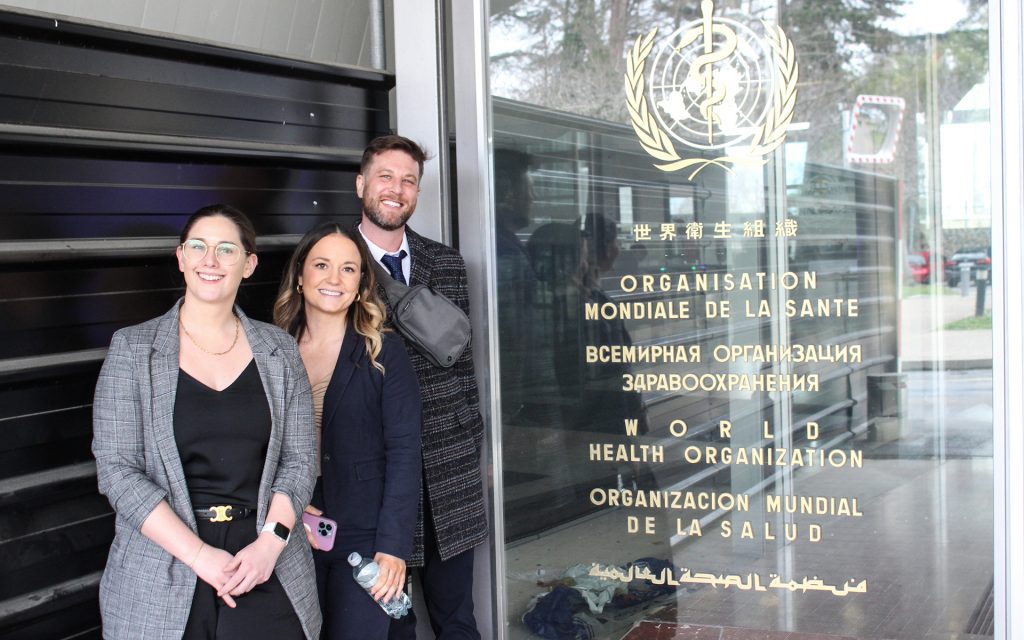
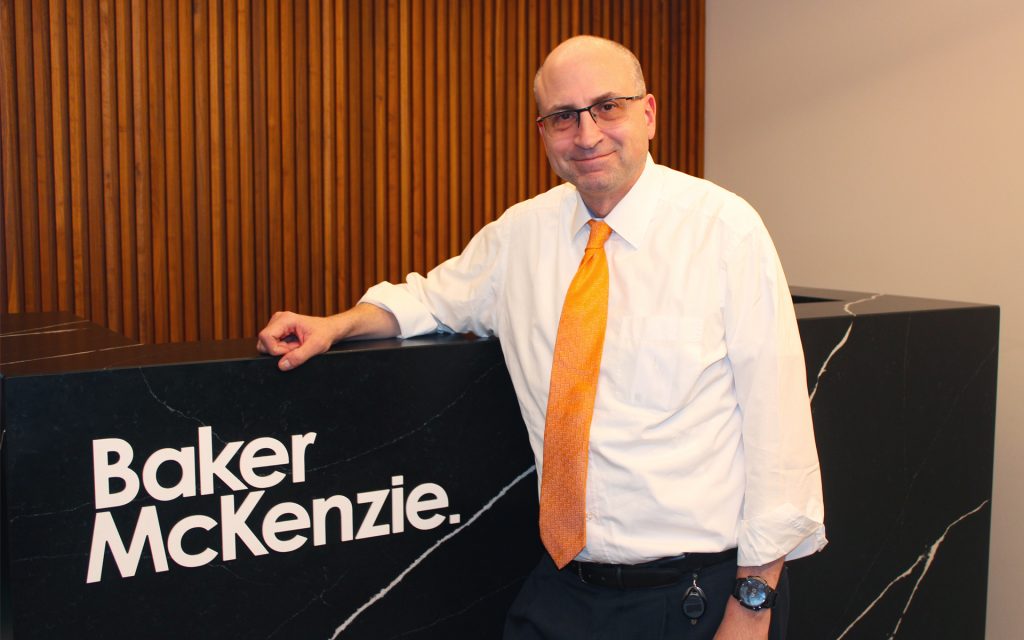

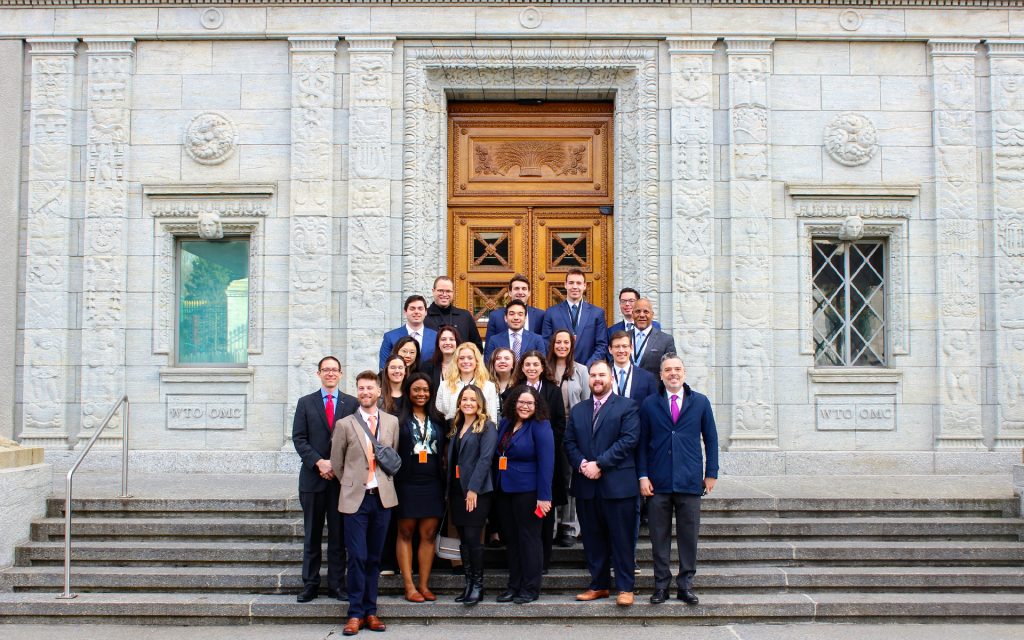

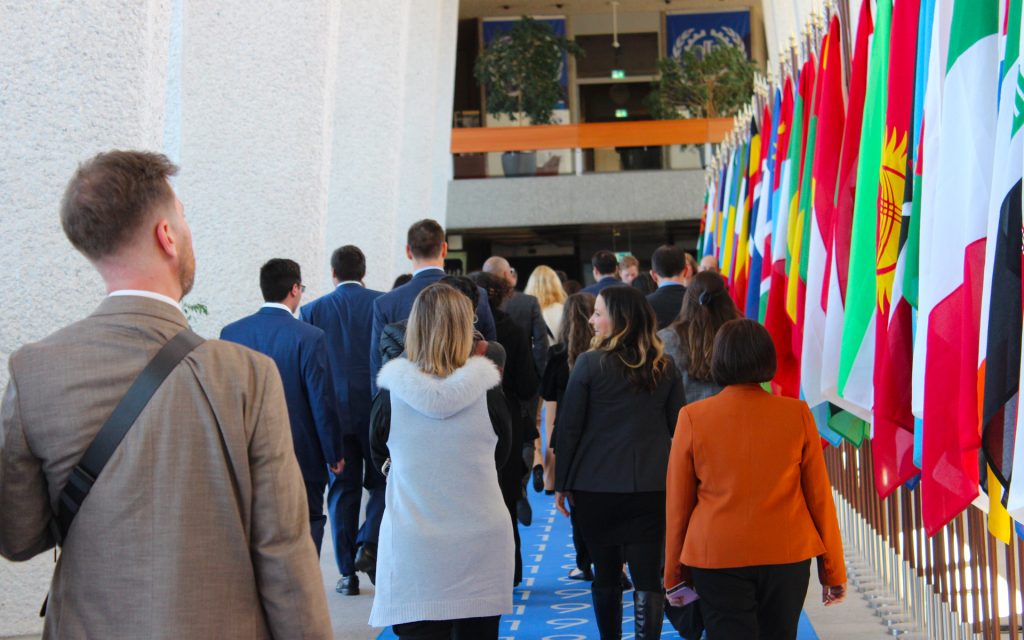
Rome, Italy: Comparative Legal Systems
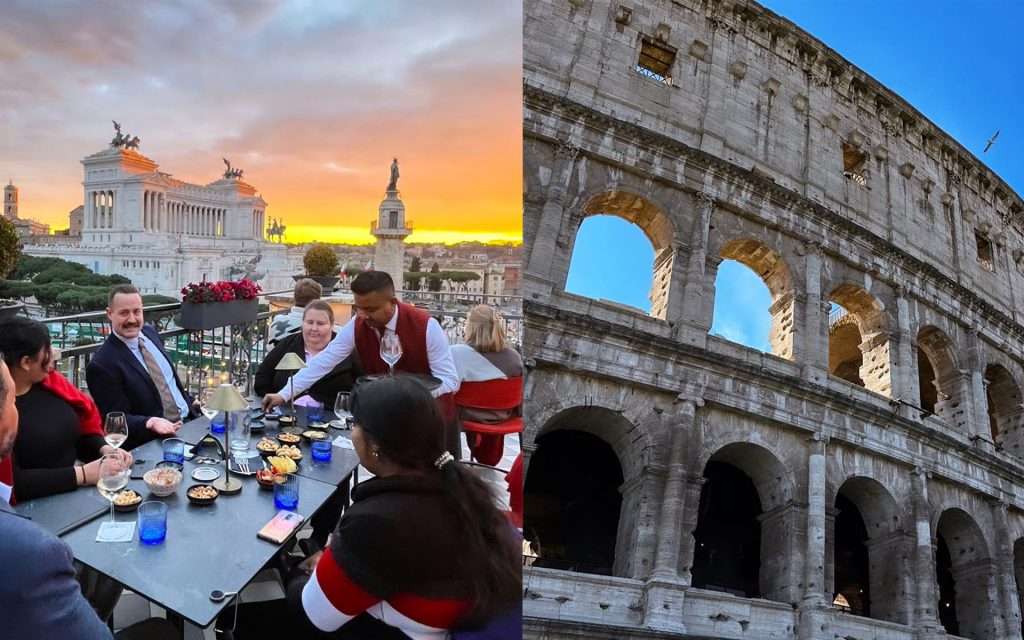
Elaine Sharpe L’25 chose to attend the residency on Comparative Legal Systems in Rome in March 2024 for two reasons: the topic and the location.
Sharpe is a member of the Syracuse Journal of International Law and Commerce and was very excited about the opportunity to take a comparative law course, which also fulfilled her international law course requirement for her law journal.
“I have lived and worked overseas and always enjoy learning about different cultures, so a comparative law course studying how legal systems differ between the U.S. and an E.U. member nation like Italy was a perfect fit for me,” she says.
The course, taught by Distinguished Lecturer Luca Arnaudo, Senior officer at the Italian Competition Authority and adjunct professor at LUISS Guido Carli University (Rome, Italy), not only provided students with information about the civil legal system of Italy but also allowed them to gain a greater understanding of how European law operates and interacts with the legal system of individual member states. In addition, the information aimed to help students develop a greater appreciation for the American legal system and its place on the world stage.
Highlights of the residency included a guided tour of the Italian Constitutional Court, guest lectures from Italian law professors, scholars, and practicing attorneys in international law who highlighted both similarities and differences between practicing law in a common law jurisdiction, such as the U.S., versus a civil law jurisdiction, such as Italy. Other activities included a study visit to the Curtis Law Firm, followed by a cocktail reception with Arnaudo and local attorneys; and an off-site visit to law firm Manfredi de Vita/Curtis, Mallet-Prevost, Colt and Mosle, LLP.
In keeping with the expression “When in Rome…,” students also took part in a pasta and tiramisu-making class and had some time to take in the historic city sites, local culture, and delicious cuisine.
“Residencies like this are a great part of the JDi program because these courses give students the opportunity to practice our legal skills through immersive experiences, face-to-face interaction and hands on exercises that allow us to apply the knowledge we have learned through our classes,” says Sharpe. “And, it was an excellent networking opportunity that allowed JDi students to connect and socialize with those in our cohort that we may not otherwise have classes with, making it a fun and instructive week.”
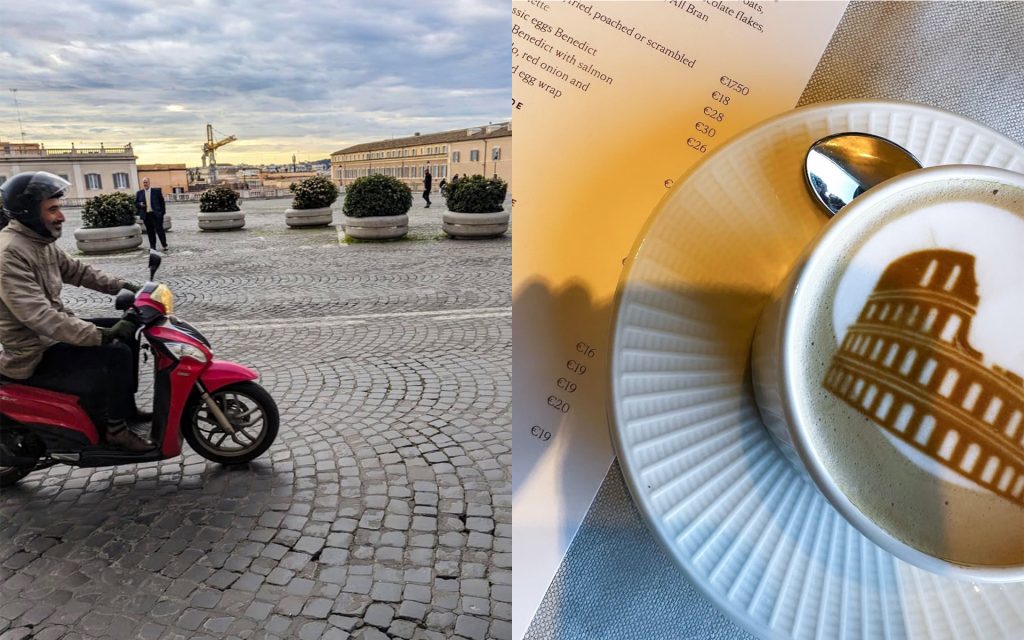
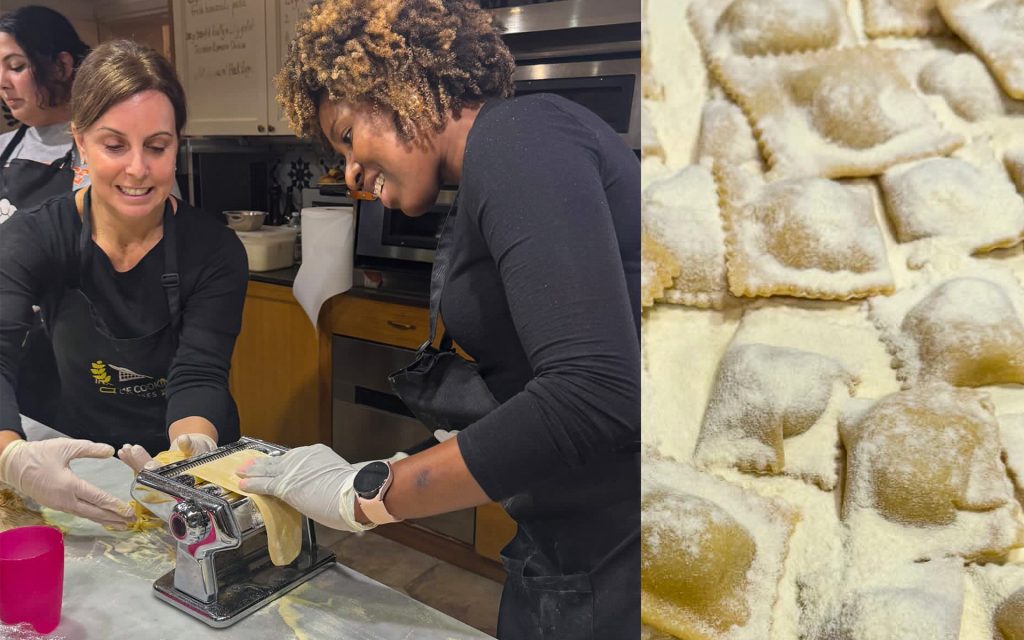
Washington, D.C.: Corporate Sustainability, Federal Practice, Elder Law
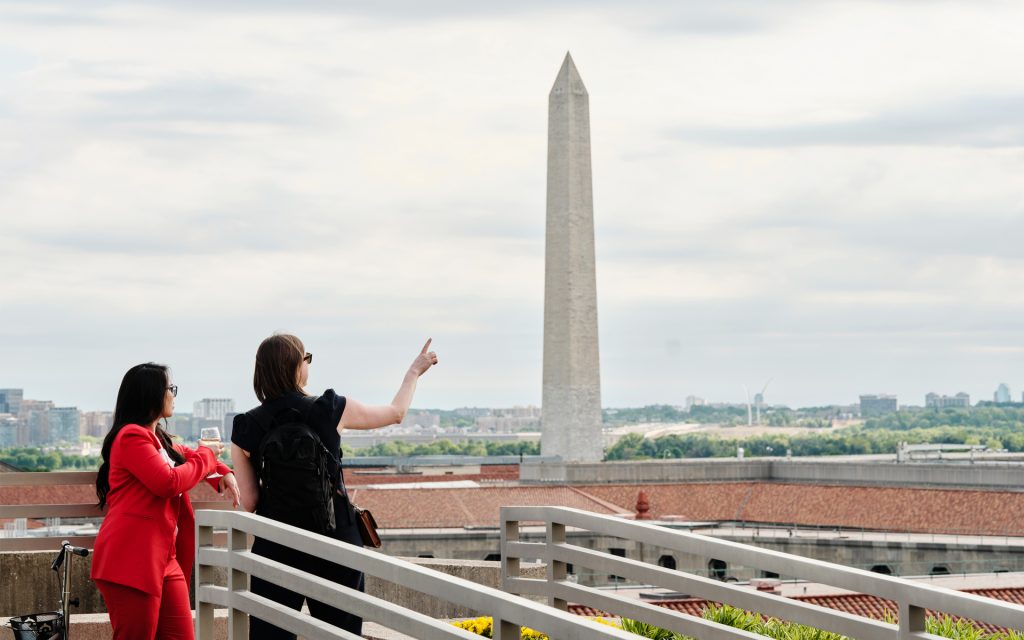
In late April, the JDi program held three different residency programs simultaneously in Washington, D.C:
- The Corporate Lawyer in a Sustainable World: In-House Lawyering for Sustainability/Responsible Sourcing Programs taught by Prashanth (PJ) Jayachandran G’98, L’98, chief supply chain counsel at Colgate-Palmolive
- Federal Practice taught by Yan Bennett L’08, deputy chair/ course coordinator—multilateral diplomacy and climate for the Foreign Service Institute
- Elder Law taught by the David M. Levy Professor of Law Nina Kohn
“Education has evolved so much in the past few decades, and I am incredibly impressed by the level of engagement, sophistication of the students’ questions, and their depth of understanding.”
Rostin Behnam L’05, Chairman of the U.S. Commodity Futures Trading Commission
Led by Jayachandran, The Corporate Lawyer in a Sustainable World residency provided students with an understanding of the role of in-house counsel in giving legal and business advice for global corporate and sustainability programs. Students came to see how sustainability has pivoted from corporate “citizenship” to a recognition that corporations have a responsibility to promote and maintain a sustainable world.
The course also outlined how volunteer sustainability efforts have intersected with increasing global compliance, including sustainability laws. Classes and panel discussions were hosted at Miller & Chevalier, as well as Morgan Lewis & Bockius. Guest speakers and lecturers included Michael Levine, chief sustainability officer, UnderArmour; Professor Jay Golden, Syracuse University Maxwell School of Citizenship and Public Affairs; and Vance Merolla, senior vice president and fellow, global sustainability, Colgate-Palmolive.
“During the residency, we learned about a concept and then split up to do group exercises. For the lesson on corporate DEI programs, our professor asked visiting attorney Ray Williams, an expert on these policies, to weigh in on what each group presented. There’s a quickly shifting legal landscape on DEI, and it was really interesting to get his feedback.”
Samuel Hudzik L’24, News Director at New England Public Media
Speakers addressing modern slavery and human right due diligence included Amy Lehr, assistant general counsel for human rights and sustainability, Mars; Richard Mojico, trade lawyer, and Mary Mikhaeel, senior associate, both from Miller & Chevalier; and Sarah Altschuller, business and human rights counsel, Verizon. Other participants who lend their expertise were Ken Kulak, partner, Morgan Lewis; Michael Littenberg, partner, Ropes & Gray LLP; Heather Welles, counsel, O’Melveny; and Ray Williams, senior counsel, DLA Piper.
“I went to undergrad at George Washington University in D.C., so I loved walking around, exploring and remembering the city,” says Samuel Hudzik L’24, news director at New England Public Media. “During the residency, we learned about a concept and then split up to do group exercises. For the lesson on corporate DEI programs, our professor asked visiting attorney Ray Williams, an expert on these policies, to weigh in on what each group presented. There’s a quickly shifting legal landscape on DEI, and it was really interesting to get his feedback.”
The Federal Practice residency led by Bennett focused on the American interpretation of international law, the interconnection between domestic law and foreign relations, and the constitutional and statutory basis for the practice of international law within the federal law system, as well as the rules-based world order and what role the U.S. should play in international leadership. It included guest lectures from the federal government and agencies, as well as private practitioners of international law, including Elizabeth Loftus-Reich, Leah Bellshaw, Amy Granger, and Elizabeth Donnelly from the U.S. Department of State, Office of Legal Advisor; Will Fork, partner at Pillsbury Winthrop Shaw Pittman; Nishi Gupta, regulatory advisor to cryptocurrency and blockchain companies, McDermott Will & Energy; Dan Hamilton, U.S. cyber command, Booz Allen Hamilton; and Dan Orr, partner, Womble Bond Dickinson.
Kohn’s residency on Elder Law and the issues that surround it was hosted by Board of Advisors member Vincent H. Cohen Jr. ’92, L’95 at Dechert LLP where he is a partner. The course provided practical knowledge for advising older adults and those assisting elderly friends or family members and covered topics that ranged from age discrimination and access to health care to advanced planning and guardianship and elder abuse and neglect. The impact that cognitive and physical impairments can have on an elderly person’s legal rights and the ability to exercise those rights was emphasized. Marie-Therese Connolly, coordinator, Elder Justice and Nursing Home Initiative at the U.S. Department of Justice, and senior trial counsel in the civil division, addressed the group.
At the end of the Washington, D.C., residencies, all participants were invited to an alumni networking event featuring Rostin Behnam L’05, chairman of the U.S. Commodity Futures Trading Commission, held at Morgan Lewis & Bockius. Students had the opportunity to ask Behnam questions about his time at Syracuse Law, the uncertainty around crypto regulations, and a recent demand from U.S. senators for information about his meetings with Sam Bankman-Fried before cryptocurrency exchange FTX imploded.
“Many individuals supported me throughout my professional career, sharing their experiences and guiding me to look for opportunities and take chances. I can only hope to do the same for the next generation so that they can better navigate their careers.”
Rostin Behnam L’05, Chairman of the U.S. Commodity Futures Trading Commission
“Many individuals supported me throughout my professional career, sharing their experiences and guiding me to look for opportunities and take chances. I can only hope to do the same for the next generation so that they can better navigate their careers,” says Behnam. “Education has evolved so much in the past few decades, and I am incredibly impressed by the level of engagement, sophistication of the students’ questions, and their depth of understanding.”
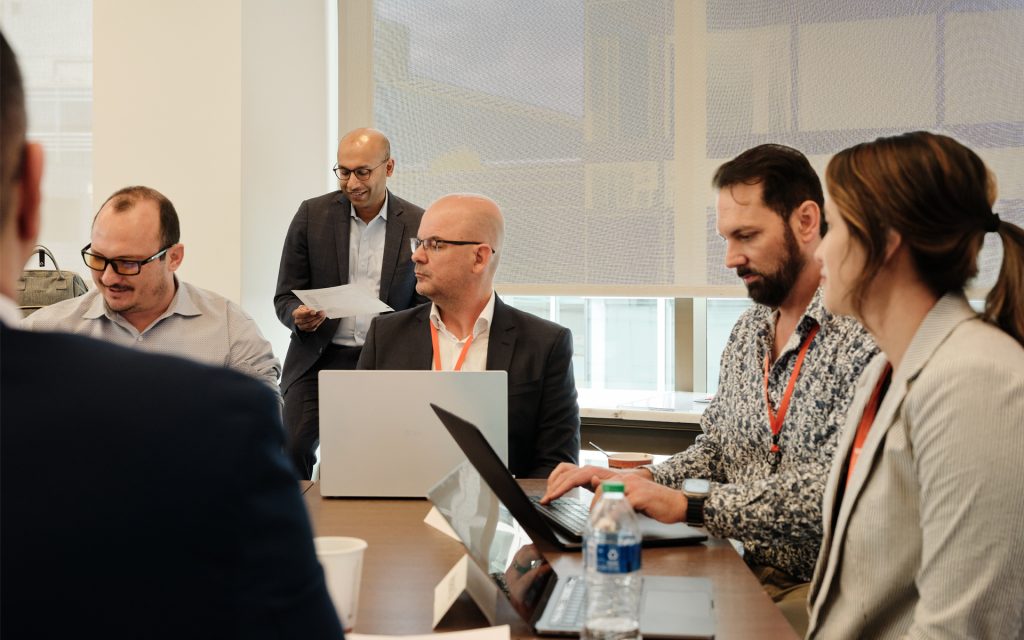
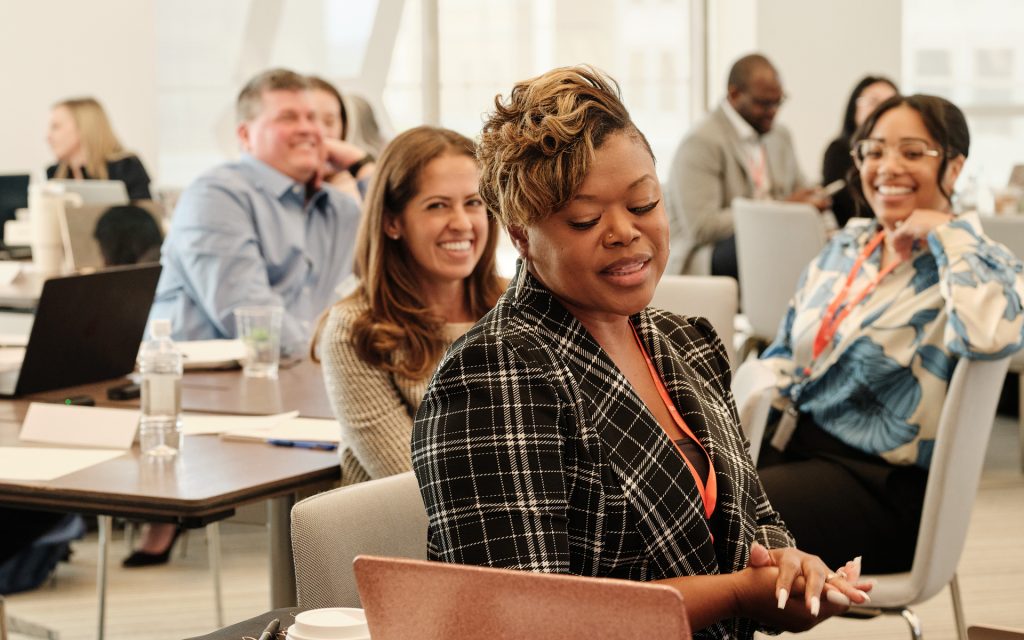
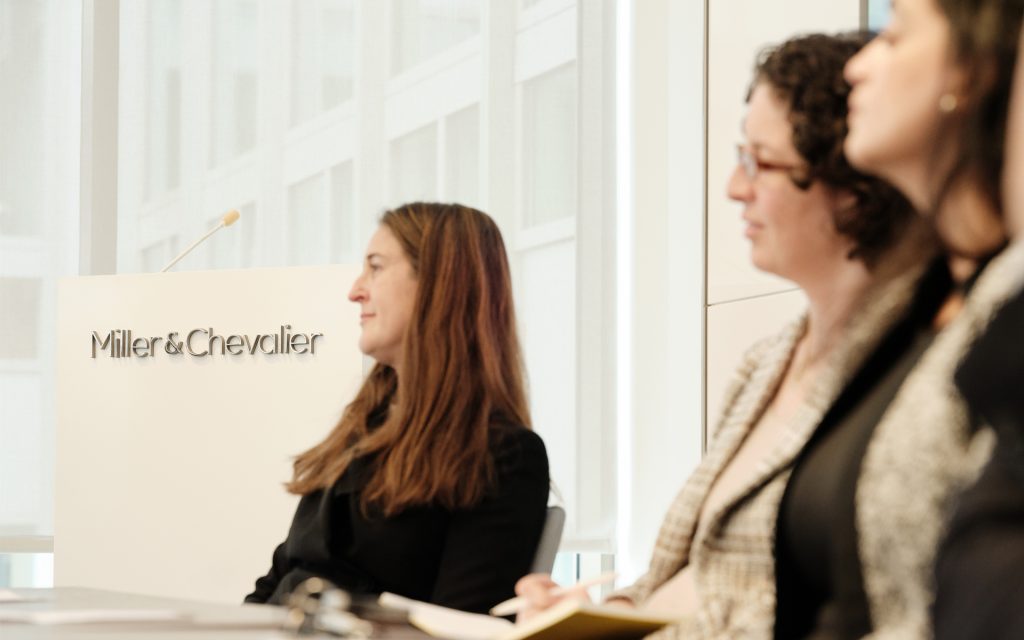
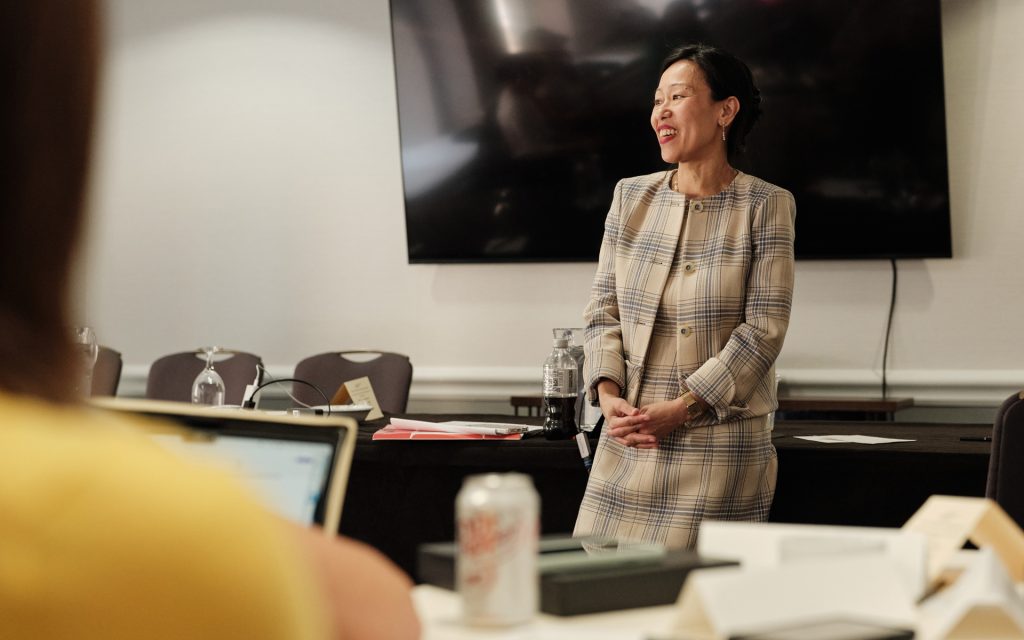
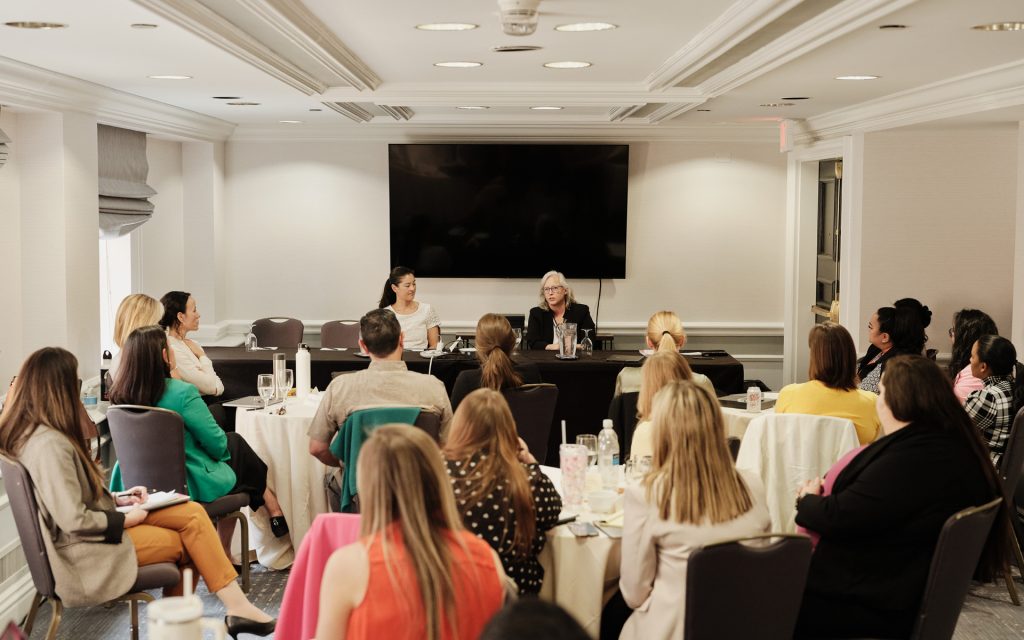
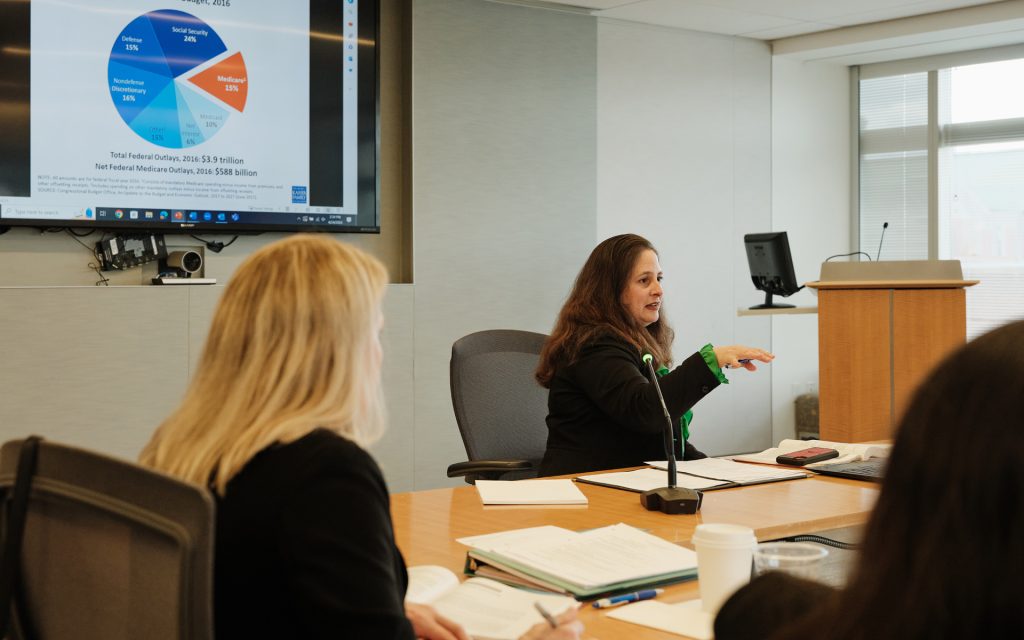
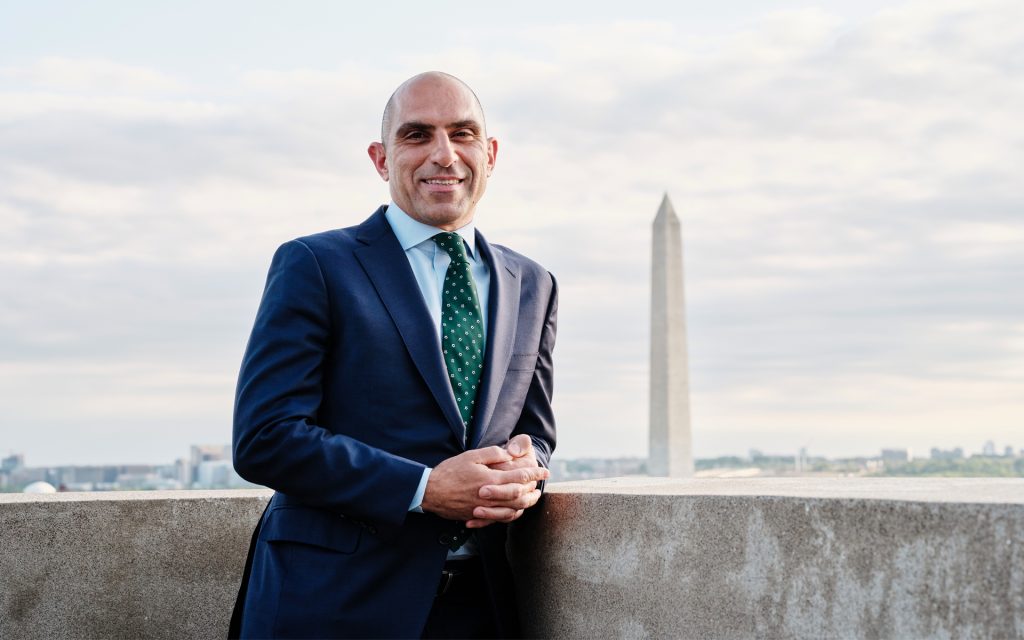
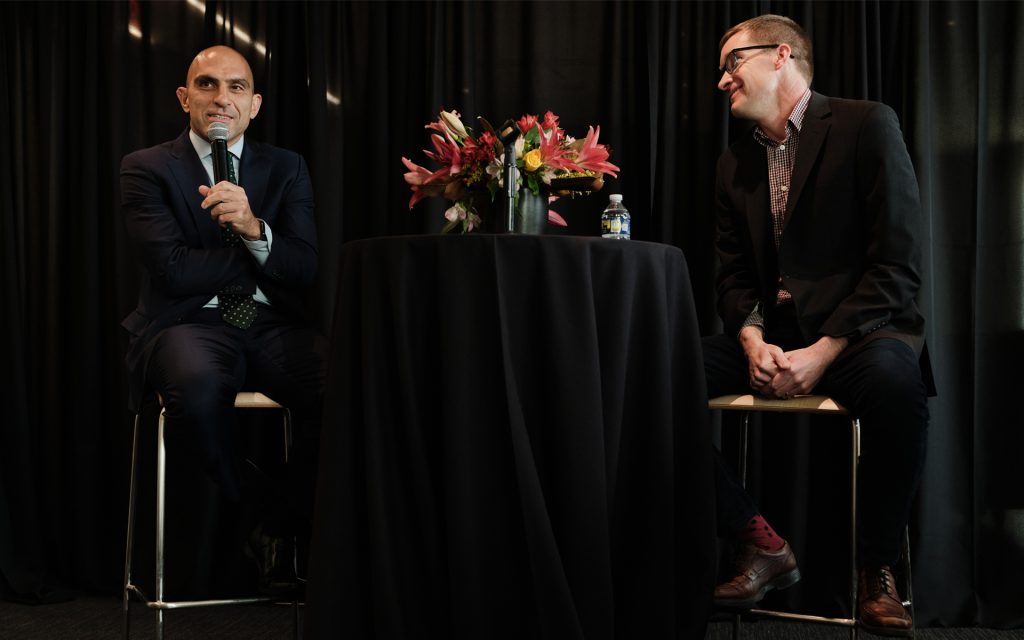
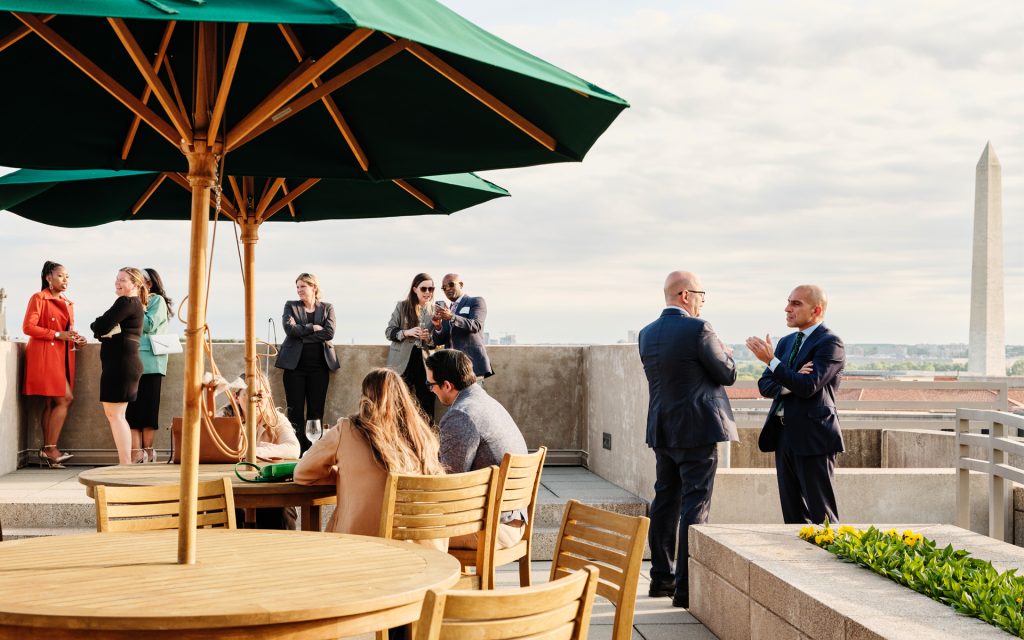
All of the recent residencies have been successful, and JDi students have given positive reviews on the content, locations, and the ability to network with alumni and, most importantly, others in their cohort.
“I cannot express my appreciation enough to my staff, members of our faculty, alumni, and other Syracuse Law partners who have made these residencies happen and given our JDi students unprecedented access to places, opportunities, and thought leaders that have certainly made an indelible impression on everyone who has attended,” says Gardner. “Our residencies have become a hallmark of our JDi program, and we will continue to promote this type of high-quality experiential learning moving forward.”
Plans for the 2024-25 academic year are already in the works and include topics like Crypto & Digital Assets, Civil Rights Litigation, and Immigration and Employment Policy scheduled to take place on the Syracuse Law campus in the fall of 2024, as well as Consumer Law and Mediation, both scheduled for Miami also in the fall of 2024. In the spring of 2025, International Human Rights and Comparative Disability Law residencies are planned for Syracuse, while Franchising Law is scheduled for Charlotte, North Carolina.
